Gopinath Raina in conversation with Arun Koul
- Cover
- Hero of my dreams
- Ded and Bub
- Early Years and Education
- Chuni, A Jewel
- Progeny
- Abortive Careers
- Career
- Post Retirement
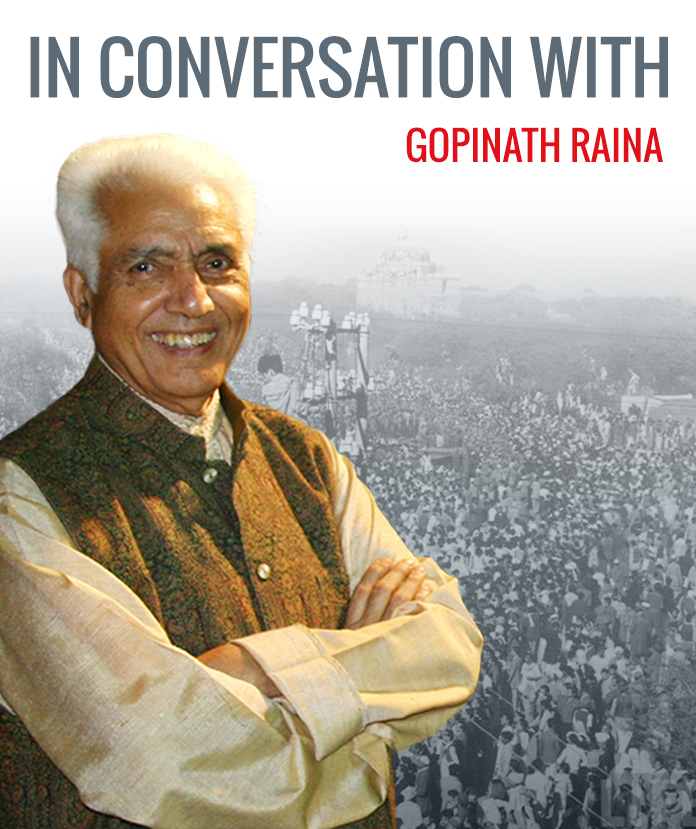 |
|
I have known Shri Gopinath Raina for a good number of years now, certainly from the beginning of this century. In meetings, he comes across as a tall, elegant man, with pleasing, handsome looks and gracious demeanor. Even in a room full of people, it is his image that first catches one's eye. He is an imposing personality, yet he seems very personable and approachable. Hence people of all ages get drawn into conversation with him. In familiarity, love and admiration many call him Papaji, which is what his children and close family members also call him.
Papaji had a long and glorious career in the Indian Information Services and also worked in media and journalism before and after that. He has contributed some of the most widely read content for magazines and journals including our Shehjar. Such has been his impact as a journalist and writer that I have been wanting to do a biographical interview with him. But then he looked and performed so much as a person still in his prime, both intellectually and physically! One would think that there is a lot of time remaining to do that. Papaji recently turned 93 but it would be impossible for any person not in the know to place him in that quadrant. He easily looked 25 years younger. Very recently, during conversation with Deepak Ganju, Papaji's son, I came to know that Papaji now has Stage 4 colon cancer, which is also trying to overpower his lungs. This was shocking to say the least. There has been so much tragedy in the family lately that one felt like breaking down. Papaji's youngest son Akshay passed away from cancer at the age of 51 and his young granddaughter (Deepakji's daughter Neha) had passed away just 2 weeks before this tragedy. I asked Deepakji if we could approach Papaji for an interview because there could not be a way that the experiences and advice of such a Karam Yogi should remain undocumented. Deepakji agreed and so I sent Papaji a series of interview questions. Purportedly, the purpose was to find out how Papaji had managed to carry sharp intellect in a robust looking body even at his age. Also to seek answers about how to gracefully and ideally deal with all kinds of ups and downs in life. He wrote back to me soon. "Namaste, Bete. It is your innate goodness and hereditary acquired aptitude that makes you so humble." |
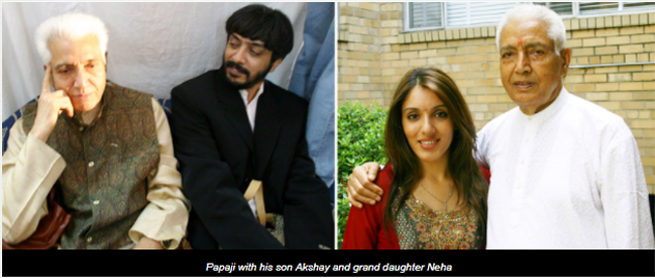 |
|
"Now, to your questions. You say that many years back, you were surprised to know that I was then in my 80s whereas you would not have thought even 60s. Well, many years ago, my life style and my physical being defied the age concept. By and large people would not place me beyond 65. The reasons seem easily identifiable." |
Hero Of My DreamsIn Delhi, I made it a point to visit Birla House regularly to attend the evening prayer meetings of the hero of my dreams, Gandhiji. I had had the privilege of seeing him first a few months earlier during his visit to the beautiful valley of Kashmir. The Mahatma had gone there to probe the mind of the State ruler, Maharaja Hari Singh who had not been able to exercise his option as to which of the two newly independent States of India and Pakistan he should join under the British Plan of transfer of power. Bapu, as the Mahatma was endearingly called, had gripped my young mind, not merely because of his saintly qualities but more because of his life's philosophy. What had impressed me most was his insistence on being good to fellow-beings and in alleviating the suffering of others. True spirituality lay in the service of the needy, the lowly and the lost. "There is no escape for social service; there is no happiness on earth beyond or apart from it. The realization of Truth is impossible without a complete merging of oneself in and identification with the limitless ocean of life," he would say. The immeasurable goodness of his spirit that admitted nothing narrow, mean or selfish in its scheme of things was the secret of his towering stature. He held no rancor against anyone. I was sold to his metaphysical postulate that "Truth is God" and not the vice versa. He had an irrefutable argument saying that 'denial of god we have known but denial of truth we have not known'. He was a saint, not the one who retreated to the forests, but the one who lived in society and worked for its uplift. Speaking of him once, Nehru echoed my thoughts beautifully: "As he grew older, his body seemed to be just a vehicle for the mighty spirit within him. Almost one forgot the body, as one listened to him or looked at him and so, where he sat became a temple and where he trod was hallowed ground. Obviously, he was not of the world's ordinary coinage; he was minted of a different and rare variety. Sometimes, the unknown stared at us through his eyes." Dr. S. Radhakrishnan summed up Gandhi's personality when he said: " To be true, to be simple, to be pure and gentle of heart, to remain cheerful and contented in sorrow and danger, to love life and not to fear death, to serve the spirit and not be haunted by the spirits of the dead, nothing better has ever been thought or lived than Gandhiji since the world first began." Gandhi's Martyrdom On the fateful day (January 30, 1948), I was taking the test at the Broadcasting House on Parliament Street for a job in All India Radio (AIR) when all of a sudden AIR interrupted its program network at 1700 hrs to announce to the world the sad news of Gandhi's death. "Mahatma Gandhi has been shot and killed"-this sad announcement was continuously broadcast from the booth next to the room I was in. |
 Mournng crowd at funeral procession |
|
Shocked beyond words, I rushed to the Birla House, cursing myself all the while for having missed his last prayer meeting. Thousands and thousands of mourners, sobbing and crying, were pressing toward the scene of the tragedy following repeated broadcast by AIR and the word-of-mouth news that travels with lightening speed in our country. No one, including me, had expected that Bapu would leave us so soon, particularly after he had survived the explosion of a home-made bomb at the prayer meeting only ten days earlier. But now that the greatest man since Buddha was no more, the sense of personal loss was unbelievable. |
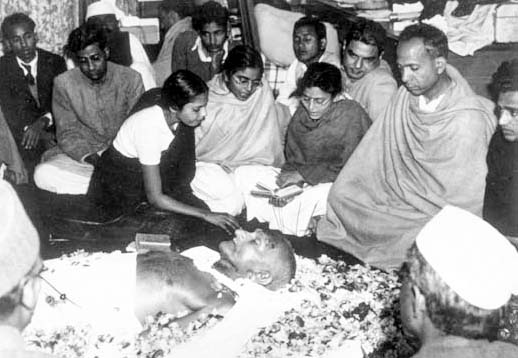
Gopinath Raina near Gandhiji's corpse
|
|
Meanwhile, free India's first Prime Minister, Jawaharlal Nehru, with his face turned ashen gray, climbed up on the gate of the Birla House to address the people who had gathered in millions to pay their last homage to the departed leader.. With pain, anguish and shock visible on his face, Nehru spoke in faltering tone: "Mahatmaji is gone and the great light is extinguished. Darkness of sorrow and distress surrounds us all. I have no doubt, he will continue to guide us from the borders of the Great Beyond. But we shall never get that solace which we got by running up to him for advice in every difficulty." At this point, the brave and courageous Prime Minister broke down and wept profusely and the mourning thousands like me wept with him. |
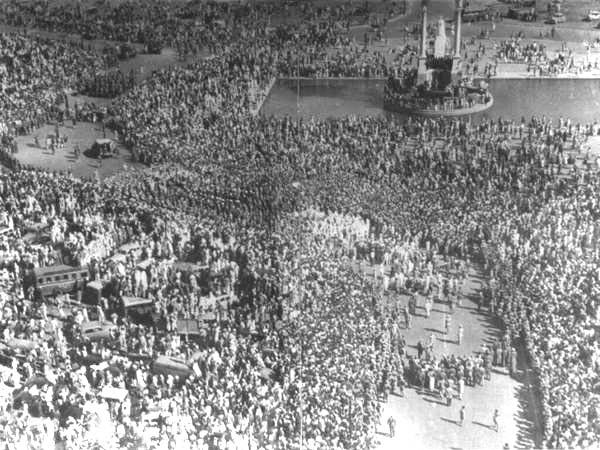 |
|
From the humble peasant to the proud potentate, from a soldier like Gen. MacArthur to a simple child like Pearl S. Buck's son, from intimate friends and relations to utter strangers who had not, probably, even as much as seen him in a picture-all felt, more or less, the passing of something good, noble and loveable. For some enlightened Christians, Christ's sublime utterance "I am the Resurrection and the Life" had found meaning once more in Gandhi's martyrdom. |
 |
|
Finally, before the cortege was ready to start, Gandhi's body was draped with the yellow, white and green flag of free India. Sushila Nayar who had received the news in Pakistan arrived just in time for Bapu's last farewell. She threw herself on the bier and clung to Gandhi's feet, sobbing and crying.
I joined millions of mourners who moved with the greatest of all processions, a human stream, as it were, winding along a five-mile course, gathering unto itself all the tributaries of the countryside. The procession grew and grew until it was a mighty river, miles long and a mile wide, flowing toward the sacred Yamuna river. The flag-draped body on the profusely flower-decked gun-carriage was led by armored vehicles, the mounted cavalry of the Governor-General's Bodyguard fluttering a thicket of pointed pennants (bayonets), red and blue uniforms of the Rajputana Rifles and other military units. At the cremation site on the banks of the Yamuna, three Hindu priests were pouring ghee (melted butter) on the pile of sandalwood logs. The uncontrollable crowds, shouting 'Gandhi amar rahe' (May Gandhi live till eternity!), were trying to surge close to the pyre in a bid to have one last glimpse before the great soul was given over to the flames. As the chief priest began his ceremonial chanting of Vedic mantras and the first red flame licked up toward the sky, the pressure of the crowd knew no bounds. The oddly assorted group, including the Lord and Lady Mountbatten, the Chinese Ambassador, Maulana Azad, Sarojini Naidu and Rajkumari Amrit Kaur, who were sitting cross-legged on the ground close to the pyre, had to rise to their feet and cling together to save themselves from being trampled under. A live commentary, the first of its kind, on the last journey of one of the greatest of all times was broadcast by All India Radio and the commentator was none else than my dear friend and colleague, the world-famous broadcaster, Melville de Mellow. After witnessing the embers of Gandhi's funeral pyre touching the skies, the millions of mourners left Raj Ghat before it was too dark to stay. Gandhi's family members and some others, including myself, were still there, perhaps, to keep vigil until the flames of the immortal fire burned low. As the flames finally settled down late in the night, it was time for everyone to leave. |
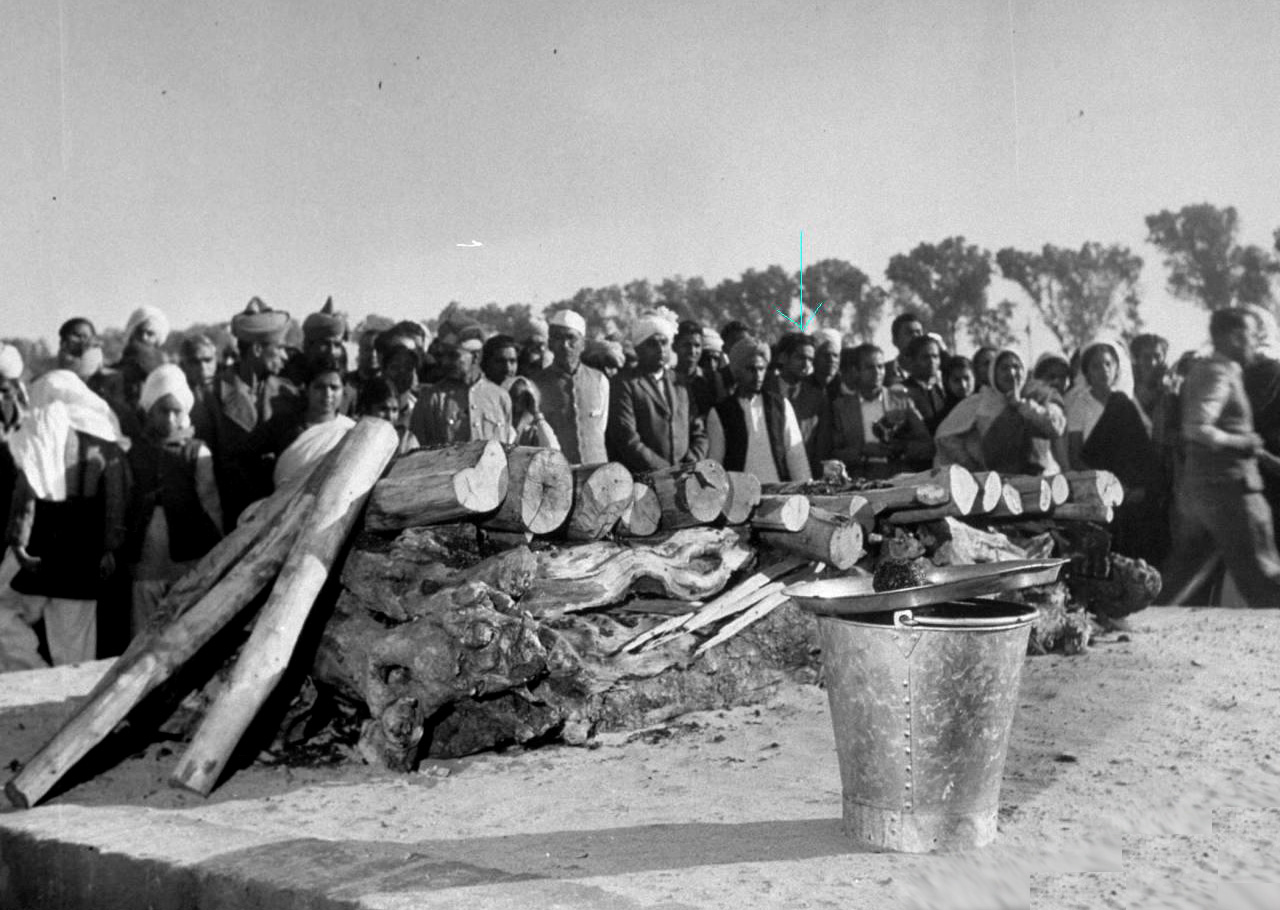 |
|
Being new to the city, I was not very familiar with its topography. I did not know the return route from Raj Ghat. To my good luck, Gandhi's youngest son, Devdas, who had lit the pyre earlier in the evening, was there while all others had left by now. As soon as his eyes fell on me, he instantly sensed my helplessness. "What are you doing here, young man?" he asked. "I am new to this place. I will not be able to find a way out this time. I might stay on till day-break," I told him. He promptly offered me a lift.
On our way back, the journalist in Devdas inquired about my whereabouts. He asked me questions about the State I belonged to and whether I had completed my studies. I told him that I had done Masters in Philosophy and had come to Delhi from Kashmir in search of work. As soon as he reached his office-cum-residence in Connaught Place, the crowded shopping center of Delhi, he asked me if I wanted to be dropped at the place of my stay. "No, thanks", I said. "It is at a walking distance from here". By this time I had known that he was the editor of India's premier national daily, The Hindustan Times, besides being the son of Gandhi and son-in-law of India's first Governor-General, C. Rajagopalachari. I expressed my gratitude to him for helping me out of that lonely deserted cremation ground. Before I took leave of Devdas, he told me to see him in his office the next day. |
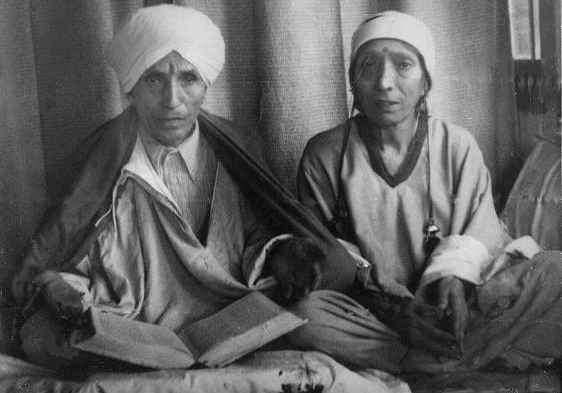 |
|
I had the great good fortune of having been born to parents who were highly cultured, noble and god-fearing. If I developed any interest in things spiritual from my very childhood, I can easily trace it to my blessed parents, the saintly mother 'Ded' and the scholarly father I called 'Bub'. Both of them were deeply religious. My revered mother would regularly visit Hari Parbat early morning for 'darshan' of goddess Sharika and my dad would spend nearly two hours in worship in a separate room reserved in the house for gods, called 'Thokur Kuth' in our language.
Even though I was posted far from my hometown, I had the great good fortune of serving my blessed parents in Shimla in two spells covering a period of about six years. After the death of my respected mom in 1959, my father spent the last three and a half years of his earthly sojourn with me in Shimla, giving me the rare privilege of serving him during the last phase of his life. |
1.The Saintly MotherI have had the great good fortune of having been born to parents who were highly cultured, noble and god-fearing. If I developed any interest in things spiritual from my very childhood, I can easily trace it to my blessed parents, the saintly mother 'Ded' and the scholarly father I called 'Bub'. Both of them were deeply religious. Even though I was posted far from my hometown, God provided me the opportunity to serve my blessed parents in Shimla in two spells covering a period of about six years. |
Early YearsMy revered mom was born on 31st of March in 1887 to highly respected Brahmin family of Srinagar, She was the eldest child of her parents, Babakak and Yembarzal Ded,. She was hardly five when she lost her mother. Her father remarried soon after. My mom had at least seven step sisters and one step-brother. However, in accordance with the custom those days to marry girls well before they attained the age of 10, my mom, Ranimi was her maiden name, got married when she was just 7. Often she recalled the childish quarrels she used to have with her husband over homemade toys etc. After marriage, my grandfather, Pandit Kawal Kak, gave her another name, Vishamali. Thereafter she was known as both Vishamal Ded and Ranim Ded. Beginning her marital life at 13, my mom, I was told by her, gave birth to 17 children out of which only five survived, thanks to the scourge of the times-infant mortality. Her first surviving child was a daughter, Sati, born in 1906 when she was 18. She had her second surviving child, a son, Badri Nath, in 1914, followed by another surviving daughter, Durga, in 1916. In 1919, she was blessed with second son, Janki Nath. |
"Almond Prasad"Four years later, a close cousin of my mom, Gopal Nath, a famous Tantrik Yogi of his times, asked her to give her 4-year-old Janki Nath in adoption to his only son and the only child, Niranjan Nath, so as to perpetuate their family lineage. Niranjan Nath, also a Tantrik by profession, had vowed not to marry. My mother was naturally reluctant to part with her second male child. Gopal Nath, as my mother later told me, persisted with his request and used his spiritual power to influence her decision. One day while in Puja, the Tantrik mystic picked up an almond from the Prasad he had offered to God and told my mom: "Here, take this almond and by God's grace you will have a son in just 12 months from now." Prasad was accepted and Janki Nath was given over in adoption. About 13 months later, my mother gave birth to me, the last surviving child. She would often refer to me as "Gopal Nath’s Almond Prasad". I have no idea whether this story had anything to do with naming me Gopi Nath. |
ReminiscencesI have faint recollections of childhood days when my mother would spend late nights nursing the sickly child in me. In fact, I am told that I had been the cause of suffering to her at the time of my arrival in this world. I did not emerge from my mother's womb in the normal way. It was quite the opposite, legs first and then the head, causing her great pain and agony. For nearly two to three hours she was said to have struggled between life and death. Being the youngest, revered mother paid greater attention to me. Despite her pronounced affection and weakness for me, I was more drawn to my father. And when at the age of four I fell seriously ill and did not respond very favorably to medical treatment, my father was called from the place of his posting. Within days of his arrival, I recovered. Based on this incident, a decision was taken that I should accompany my father. It was a difficult moment for my mother to bear separation of the one she was so fond of. But she made the supreme sacrifice of her love for she knew that I would be happier with my dad. Only she could do it, equipped as she was with stoic approach to life as such. I remember once after I returned from college, she gave me some snacks to eat and while I was munching the famous Kashmiri 'kulcha', she called me to the window overlooking the bedroom of a close neighbor. There the recently married couple were having evening tea in a jolly mood, laughing and coaxing each other. She told me that she wanted to see me and my wife in a similar happy playful mood one day. And her day came. I was married in the fall of 1947 and on the third day after the wedding she told me to lift my wife from my bedroom on the second floor and bring her before her and my dad who were sitting in the third floor of the house. She also promised me a reward of one hundred rupees, a good sum at that time. Initially I hesitated because my wife was weightier than me and I knew I would not be able to lift her up. But I did not want to disappoint my mother. I took my wife in confidence and persuaded her to walk up to the last staircase where I lifted her for a few seconds and brought her in presence of my dear parents. My mother's joy knew no bounds. |
Her Passing AwayHappily married, she lived on this planet for 72 years before she passed into eternity in the early hours of the most auspicious day of Baisakhi on April 13, l959. . A great Yogini that she was, her end came so peacefully within an hour of returning from her usual visit to Hari Parbhat, the abode of goddess Sharika. In that one hour before she left for her heavenly abode, she laid puja samagri for her husband's morning worship, visited the neighbors as part of her daily routine to inquire about their welfare and then did her kitchen chores to prepare tea for breakfast and food for the lunch. As soon as she finished her morning tea, she left her mortal coil in a sitting posture in presence of my father, my brother and his family. Shocked beyond words at the sudden and unexpected turn of events, they simply marveled the way my dear mom literally walked into death in a completely relaxed manner. The neighbors, who had talked and chatted with her, only a few minutes earlier, refused to believe that she was no more. |
Telepathic PhenomenonI was away in Shimla with my family when my respected mother passed away in Srinagar. A telegram conveying the sad news reached me at about 11:00 A.M., two and a half hours after she had breathed her last. But what happened at our end that morning is a vivid demonstration of what in occult science is known as the phenomenon of telepathy. Baishakhi, a popular Hindu festival, marks the arrival of spring and is usually a day of fun and frolic for both young and old. We had, therefore, planned to go on a picnic on this day to one of the scenic spots around Shimla. The only hurdle to surmount was to avoid a pre-arranged meeting with a friend on that day in my house. I picked up the phone at 9 O'clock in the morning to request my friend, a Sardarji, for postponement of the proposed meeting. As he was not home, I left a message with his wife for the postponement of the meeting that day. Instead of simply telling her the real cause behind putting off the meeting with her husband, what slipped from my tongue, inadvertently though, was that there will not be any meeting in view of the death of a relative in Srinagar. No sooner did I put the phone down than did I realize that I had spoken an obvious lie. How and why such a thought should have come to my mind at all, I have not been able to fathom to this day. The phenomenon of telepathy, it is clear, had worked and whispered, as it were, into my ears that something terrible had taken place hundreds of miles away. And the inevitable had occurred. My saintly, soft-spoken mother had actually passed away in my hometown, Srinagar, exactly half an hour before I blurted out the apparently false excuse to wriggle out of the proposed meeting. And by the time we were almost ready to leave for the picnic, we got the wired message. The idea of going on a picnic disappeared in thin air. We hurriedly packed our clothes and children's books for a longer vacation. The food readied for picnic was used during the 3-day journey to our hometown. As we were leaving the Shimla house for the railway station, Sardarji appeared to express his condolences. On learning that I had lost my dear mother, he asked me why did I not tell his wife about my mom's passing away. He was taken off his feet when I told him frankly that the excuse of a relative's death was just the slip of tongue and that I did not have any knowledge, whatsoever, of any such happening at the time of talking to his wife in the morning. We reached Srinagar on the third day of my revered mother's death. |
Pious and Kind"She was a great and a pious soul" was the refrain of all those who came to our house to express their condolences. Undoubtedly she was a kind, benevolent, pious and truthful person. Generous to the core, my mother helped all those who sought it and would never turn away anyone, even a beggar, empty-handed. Unlettered though, all our relations, neighbors and friends would invariably seek her advice and guidance for their day-to-day problems. |
Her Philosophy of LifeAn epitome of forbearance, she would always say that one should have the patience and the broadmindedness of a river like VITASTA which flowed through Srinagar city, quietly absorbing all the muck that was thrown in it. Extolling the virtue of patience, she would, more often than not, refer to the following couplet of the famous saint-poetess of Kashmir, Lal Ded: "Sabur chuy zyur, march ta nunay
|
2.Scholarly FatherMy revered father was a great Sanskrit scholar who had mastered most of the sacred scriptures, the Vedas, the Upanishads, Bhagwad Gita, the Ramayana, Mahabharat, and the Puranas, Vishnu Puran and Bhagvatam, in particular. An oriental teacher by profession, he used to hold Ramayana classes at home in the evenings after returning from his teaching job. Before retiring to bed, he would, often, narrate me stories from the scriptures, which was primarily responsible for my religious enthusiasm to the extent that I started wearing a rosary, normally used to do Japa (repetition of God's name), at an early age. I would also accompany my mom to Hari Parbat and spend an hour in daily prayers at home. |
"Hola Mund"As a child, I was drawn more to my father than to my mother. I very well remember how when I was hardly four, I was struck with fever which did not subside for nearly two months. The elders had a name for such a phenomenon. In native language they called it "hola mund" which means 'to be struck with the fever of intense love and longing'. Since my condition did not show any appreciable improvement after proper medical attention, urgent summons to come home went out to my dad, a government teacher posted at that time in a school in Kulgam, a village about 65 miles from my hometown. My father, equally fond of me, responded promptly. As soon as I saw him and sat in his lap, the fever that had afflicted me for so long took to heels. A miraculous recovery! |
Father's NirvanaNovember 30, 1962, Friday; it was 9:00 a.m. Deepak was down with fever. While father was doing Puja, I was preparing to leave for office. All of a sudden, a thought crossed my mind that I should not go to office. There was absolutely no reason for such an idea. Just for the heck of it, I thought of taking an off. But my father persuaded me to go, for he knew that it was the day when Chinese troops were to begin voluntary withdrawal from the Indian soil. I had never disobeyed my father. So I left for office, unwillingly though. And before I had even opened the drawer of my table in the office, a phone call was received. Deepak was on the line. In quivering tone, he informed me of father's illness. He did not tell me that my dad was no more. I rushed back but it was too late for me to see him alive. He had, in fact, passed into beyond immediately after I had left for office. |
His Prophetic WordsThe prophetic words he had uttered that very morning still ring in my ears. He told me: "I know you have been studying astrology quite seriously. You are keeping yourself updated by subscribing to magazines on the subject, particularly B.V.Raman's Astrological Magazine. Let me add to your knowledge a leaf from my personal experience. Anyone having Saturn in 5th house, and that, too, in a debilitation sign, would not have any of his children by his bedside at the time of death. And you know that I have debilitated Saturn in my 5th house. If and when I leave this world, you will not be by my bedside. In fact no child of mine would be there." I took his words lightheartedly. My false pride would not let me believe him, for I thought too much of my knowledge of astrology, with the help of which I had already figured out astrologically on the basis of his Annual Chart (Varsha) that he would leave his body during his 83rd year (September '62 to September '63) somewhere in March or April 1963. And in my never-to-be-forgiven arrogance, I had told my father that I would defeat the designs of his 5th house Saturn, for I had thought of taking sufficient leave round about March-April, '63 to be with him all the 24 hours before his final journey. But, regrettably, that was not to be and things turned out as my father had predicted. I was not there, nor any of my brothers and sisters. My pride was humbled. He had breathed his last in a sitting posture in a relaxed and peaceful manner in almost the same way as my mother had done three and a half years earlier. Minutes before he passed into eternity, he had been talking to my wife and his grandchildren after his breakfast, which he normally used to have as soon as he would be free from the daily puja. Tall, fair and handsome, my father lived a simple, decent and honorable life. Unassuming, he never wished ill of others. Being a high school teacher, he did not enjoy economic prosperity. Yet, he believed in giving. He did give away, not money, but the wealth of his knowledge to all those who sought it. He never expected any reward for what he did. He would always volunteer to help those in need. While he had an amiable, quiet nature, he would, at times, lose temper not with children but with my mother, a fact that I often resented even though he was my ideal. He maintained overall good health. It was only a few years before he left his mortal frame at 82 plus that he suffered from asthma, not severe though. But he overcame the problem by taking Arsenicum, a homeopathic medicine. He displayed remarkable self-control at 79 by giving up his life-long habit of smoking. He would sit quite erect, without ever bending his back. He always walked straight and was in very good shape till the last breath. Punctual in his morning and evening strolls and the daily worship, he was mentally sound and quite alert, and retained till the end the alacrity, the balance of mind and sobriety that characterized his basic approach to life and its problems. |
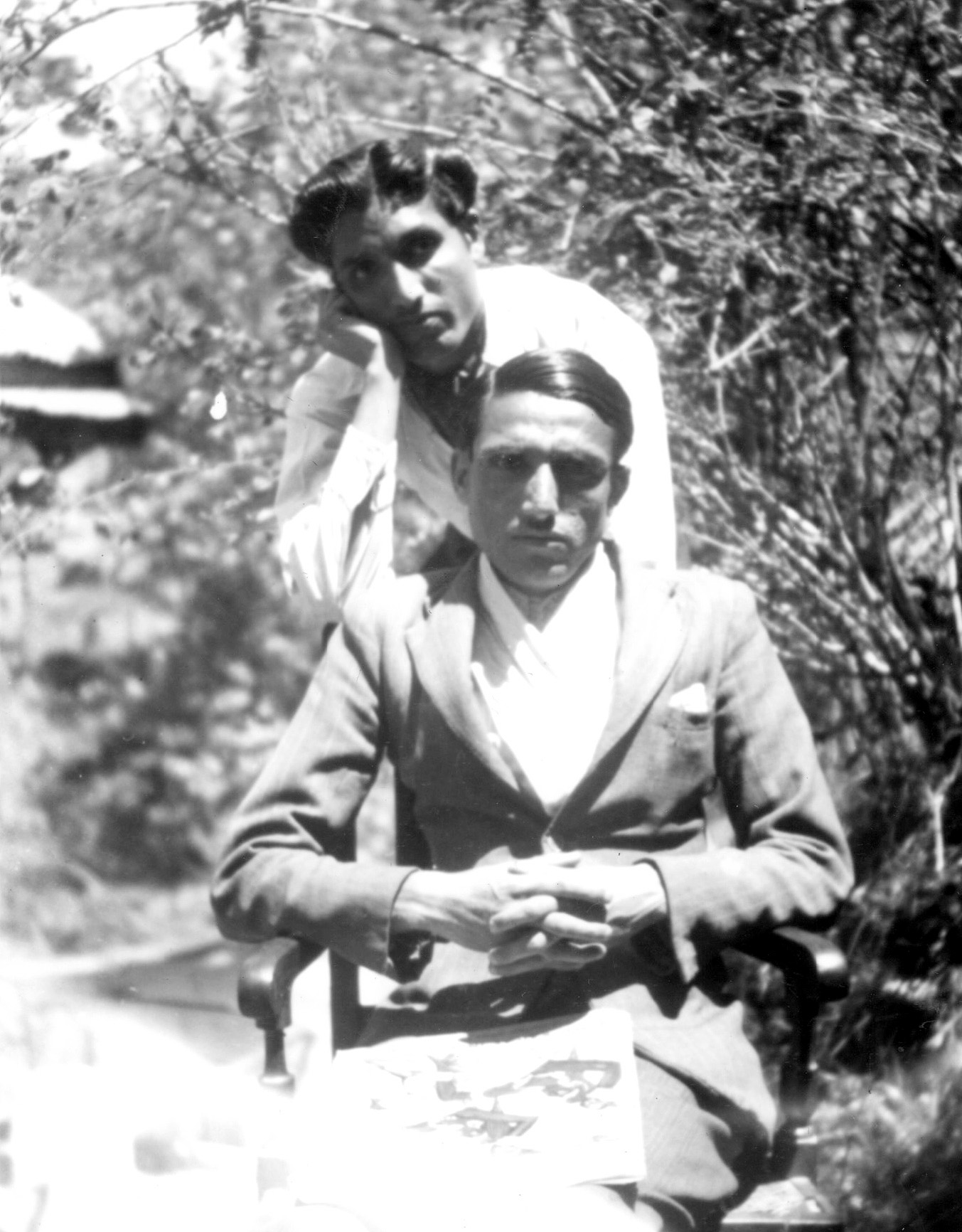 Papaji with his elder Brother Badrinath in Srinager 1946 |
Father takes rebirthWe collected the ashes according to our custom on the 4th day of cremation. Normally, the Hindus in north don't store the ashes in homes; they prefer to either immerse them in a holy river like the Ganges the same day or store them somewhere outside the house. In this case, we did not have any holy river nearby where we could immerse the ashes the same day. So the immersion part was postponed till the time a trip to Haridwar, UP, would be arranged at the end of the 10th, 11th,and 12th day rituals. In the meantime, my sisters who had come to Shimla all the way from Srinagar to take part in the last rites left for their respective destinations in Kashmir. The intended journey to Haridwar did not materialize till 13th of April, '63. So, the ashes were finally immersed in the holy Ganges on the day of Baisakhi, 1963. |
Interesting Anecdote:A wandering mendicant, an old man in his mid-eighties and a native of Ambala city in Haryana, used to come to Shimla in summer months to avoid the heat of the plains. We used to call him Shani Maharaj, for he would normallyvisit our house on Saturdays to collect oil, some Dakshina and sometime even partake a meal. He would often spend some time with us, for he enjoyed chatting with my father. In 1963, he visited our house in the middle of May (it was his first visit to us that year), exactly a month after I had immersed dear father's ashes in Haridwar. But this visit of his did not coincide with a Saturday. It was a weekday. So I made bold to ask him, how come Baba, you have graced us today, though it is not a Saturday. He replied that he had come today not to collect oil etc, but just to tell us about the dream he had seen that night. Both my wife and I got curious. What bearing his dream could have on us, we argued within ourselves. Anyway, he started with the details. He said: "In my dream, I saw myself in this house, and Pitaji sitting there in his usual posture. (At that point he did not know about the death of my father, for he had left Shimla in October 62 and had returned only now in May, 63.) Continuing his dream, he said that he just asked Pitaji, I am seeing you after a long time. Where were you all this while? Pitaji told me: "I had been to Haridwar and had a bath in the Ganges on the day of Baisakhi and now I am back here for good. Henceforth you can always find me here." After he finished telling us about the dream, the said Baba asked, where is Pitaji? I am not seeing him here.It was at this point that we gave him the sad news that Pitaji was no more in this world, and that he had left this Sarira 6 to 7 months back. He was distressed to know all that. |
The most intriguing coincidence:My wife and I, tried to analyze the significance of the dream but failed, and failed miserably. It was only in June, 63 that my wife saw a gynecologist who confirmed she was two months pregnant. This led us to recall the dream of Shani Maharaj in which Pitaji had declared that he was back after the Ganga bath on 13th of April. Exactly almost nine months later, my youngest son was born. I have no doubt in my mind that my father is back with me, for he was so fond of me and he had not seen me at the time of his exit from this world. This episode re-established my firm belief in the theory of re-birth and re-incarnation. |
Gone but not forgottenAs we know, all that is born must die. The birth, death and rebirth of my parents has further sealed my belief in the rebirth of the soul, without a shadow of doubt. There is no denying the fact that no encounter, however casual or long lasting, is by chance, but rather by divine design. Sons and daughters, grandsons and granddaughters and the great grand ones whether of my own blood or of my spirit, are all part of the intricately woven great design- and not a thread is ever out of place! |
"Almond" PrasadI was born in Srinagar on the longest day of the year, precisely on June 21, 1924, a Saturday, in a top Kashmiri Brahmin family of Breths. I was the youngest of the five brothers and sisters. My mother would always remind me that I was conceived after she had received an "almond" as prasad from one clairvoyant who happened to be a close relative, the husband of her mother's aunt, to be precise. A well-known tantric yogi of his time, his name was Gopal Nath who lived in close proximity to the famous Ganpatyar temple, Srinagar. He asked my mother to give her 4-year-old Jankinath in adoption to his only son, Niranjannath,an avowed Brahmachari, a life-long celibate, so as to perpetuate their family lineage. Niranjannath, also a tantrik by profession, had vowed not to marry. One day while in Puja, the tantrik mystic picked up an almond from the Prasad he had offered to God and gave it to my mom saying: "Here, take this almond and by God's grace you will have a son in 12 months from now." Reluctantly, my mom accepted the Prasad. About 13 months later, my mother gave birth to me, the last surviving child. She would often refer to me as "Gopal Nath's Almond Prasad". I have no idea whether this story had anything to do with naming me Gopinath after clairvoyant Gopaonath. Coy, quiet and unassuming, I was by no means a precocious child, nor was there anything extra-ordinary about me. I was not a crying baby either, I am told Not very affluent, my parents lived in a two-storied typical Kashmiri house of olden times, made of brick and wood with mud-plastered walls. I very well remember the low curved doorway that led to the main entrance of the house through a very narrow passage. The rooms were rarely furnished with little or no ventilation. Yet, there was something in the houses of those hoary days that once you were inside the living room, you felt cozy and peaceful. This surname was changed to 'Raina' by my first cousin, Dr. Shivji Raina, while filling the requisite form at the time of my admission in government middle school, Srinagar, in 1932, after I had returned to my birthplace from the village in the wake of my father's service transfer. My cousin himself had also changed his surname from 'Breth' to "Raina", on the eve of joining the State Medical Services. It made me really sad when I learnt much later that the prejudicial attitude of the non-practicing Brahmins was responsible for his action. Nevertheless, I must say that I feel proud of my Brahmin lineage, for I know that it is the practicing Brahmins of Kashmir like my ancestors who have kept alive to this day our rich religious and cultural traditions of yore. But, alas! The tribe is vanishing fast and the blame lies squarely on the entire Kashmiri Pandit community. -GNR |
Off to Village at 4Since I was more attached to my revered father than my mother, I accompanied him at the tender age of four to Kulgam, a village south of Kashmir, where he was posted in a high school as an oriental teacher. During the three years of his posting, my father would regularly take me along with him to school, as there was no one else to look after me in the rented house he had rented for his stay in the nearby beautiful village of Handad Chawalgam. In his wisdom, father thought of getting me admitted in the first primary class in his school, if only to ensure that I did not idle away my time doing practically nothing. Those days there were no nursery or kindergarten classes anywhere in the State, much less in a village. My formal education, however, began only on return to my hometown, Srinagar, in 1932, when my father was transferred back to the State's capital city of Srinagar. I completed 8th grade in Government Middle School in 1937. Another two years in Government High School saw me through Matriculation. Thereafter, I joined Sri Pratap College in Srinagar for my Intermediate examination. After doing Bachelor's from the newly opened Degree College, I tried my hand at Honors in Hindi (Prabhakar) as a private candidate. I had the satisfaction of my life in topping the list of successful candidates in this particular examination at 18. 8th grade in Government Middle School in 1937. Another two years in Government High School saw me through Matriculation. Thereafter, I joined Sri Pratap College in Srinagar for my Intermediate examination. After doing Bachelor's from the newly opened Degree College, I tried my hand at Honors in Hindi (Prabhakar) as a private candidate. I had the satisfaction of my life in topping the list of successful candidates in this particular examination at 18. Since there were no arrangements for post-graduate studies in Kashmir during my time, I had to move to Lahore, now in Pakistan, in 1946 to do Masters in the subject of my choice, Philosophy. A beautiful city, Lahore was modern in every sense, though it had retained Mogul character and splendor. I got admitted to the prestigious Government College, which I could ill-afford, but it was the only college in northern India those days that offered courses in Philosophy. Among my classmates in the Masters, I have a very vivid recollection of only two who had caught my imagination and even gripped my heart. One was a beautiful, vivacious Punjabi girl, Ms. Agnihotri, and the other was Javed Iqbal, the handsome, sharp, intelligent son of the great poet, Allama Iqbal. While I have had the good fortune of seeing Javed during his visit to India in the 70s with a Pakistani delegation, I never had any encounter with the Punjab beauty whose charming face has been haunting me off and on. |
My Second GuruOf my teachers at the University, the one who impressed me most was Dr. I Latif, head of the department of Psychology at the Forman Christian College, Lahore. Till this day, I regard him as my second 'Guru', the first being my parents, particularly the mother, in whose lap I learnt the first lessons of life. Dr. Latif used to take university classes in Psychology, which was one of the six major subjects of study for my Masters. His method of teaching was so thorough and direct that at one stage during the course of my post-graduate studies, I seriously thought of switching over to Psychology as the main subject. But it was Dr. Latif himself who dissuaded me from taking the step. He seemed to have rightly gauged the innermost craving of my heart, my deeply ingrained love of philosophy and my spirit of inquiry. Of course, he suggested that I could do post-graduation in Psychology as well, adding that I could make a good psychoanalyst. But that was not to be, for I had to leave Lahore for good in the midst of my two-year study course in philosophy at the height of communal tension that had erupted in the sub-continent on the eve of the historic transfer of power to India and Pakistan by the British. I left Lahore under military cover on July 4, 1947, 40 days before the partition of the Indian sub-continent into India and Pakistan. However, I did complete my Masters in Philosophy later from Punjab University, Chandigarh, India. |
Post-Graduate StudiesSince there were no arrangements for post-graduate studies in Kashmir during my time, I had to move to Lahore, now in Pakistan, in 1946 to do Masters in the subject of my choice, Philosophy. A beautiful city, Lahore was modern in every sense, though it had retained Mogul character and splendor. I got admitted to the prestigious Government College, which I could ill-afford, but it was the only college in northern India those days that offered courses in Philosophy. Among my classmates in the Masters, I have a very vivid recollection of only two who had caught my imagination and even gripped my heart. One was a beautiful, vivacious Punjabi girl, Ms. Agnihotri, and the other was Javed Iqbal, the handsome, sharp, intelligent son of the great poet, Allama Iqbal. While I have had the good fortune of seeing Javed during his visit to India in the 70s with a Pakistani delegation, I never had any encounter with the Punjab beauty whose charming face has been haunting me off and on. |
Chuni, A Jewel(Life is full of varied colors and patterns-parents, brothers, sisters, children, relatives, friends and the friend of friends. I and my spouse, I had thought, would never be separated. Yet, the inevitable did happen. And I miss her very much. However, what sustains me are her sweet memories, without which life would be meaningless. While I wait for the moment when I join her to resume the journey of eternal life, I reminisce about my entire past. ---gnraina) 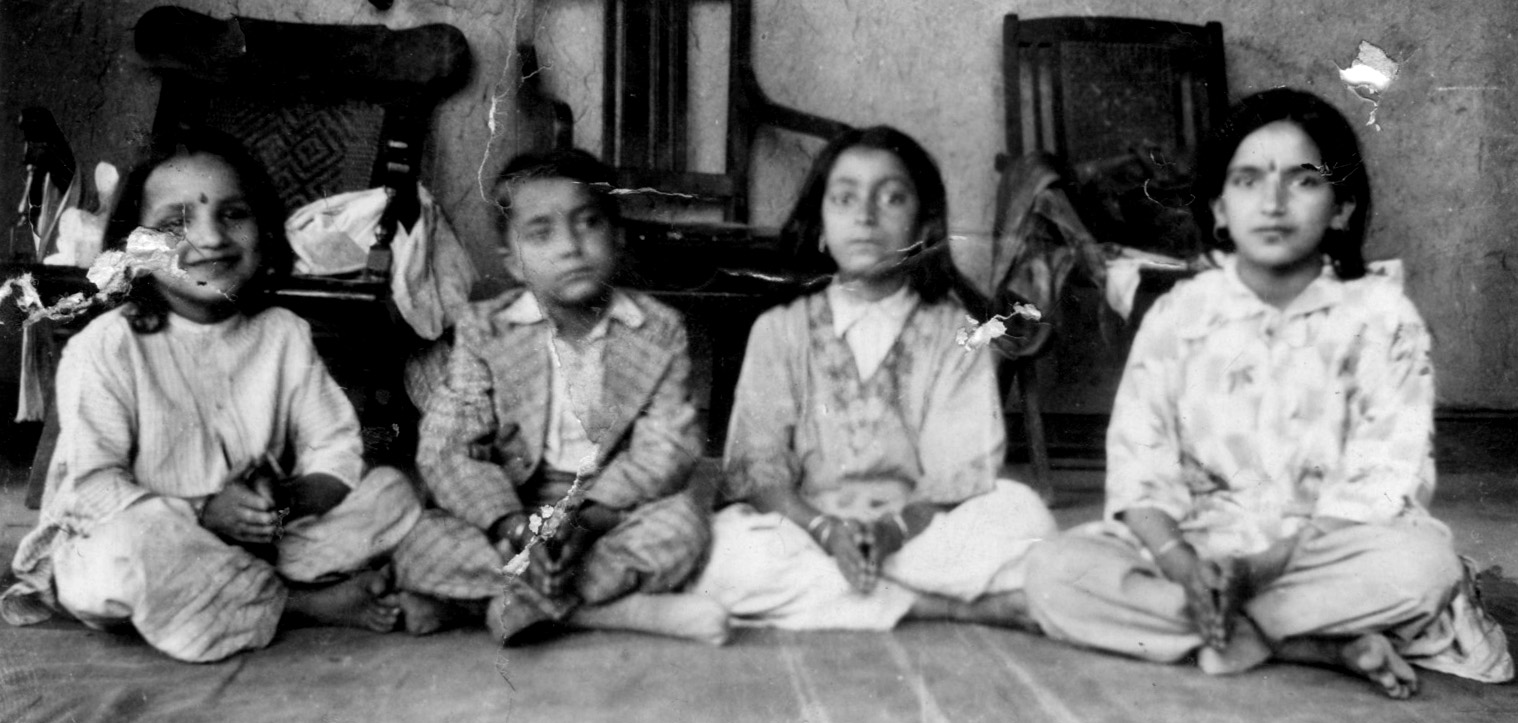 Chuni with her cousins in Srinagar as a child It was the dark, dreary night of Nov. 1, 1999, in Delhi. I was awake, while the world around was asleep. Calm and tranquility prevailed; the atmosphere was serene, somber and sanguine. In a jiffy, as it were, a flashback appeared on my memory screen of what had happened exactly 52 years ago on a similar cold wintry day in Srinagar, the capital city of India's northern State of Kashmir. I was tied in nuptial knot to a beautiful, chubby, 18-year-old college-going girl. Her name was Chuni, which in our native language means 'a jewel'. Alas! I lost that jewel to the dreaded disease, cancer, on 16th of August, 1995, when she had just turned 67, thus bringing to an end nearly 48 years of unbroken marital relationship, marked by mutual love, appreciation, cordiality, confidence and trust. Without her, I really felt lonely and lost. Reverie over, I tried to figure out the entire panorama of my life's journey in retrospect. It occurred to me that I should record for posterity my joys and sorrows, my pleasant and unpleasant experiences, my successes and failures, and above all my thoughts on varied aspects of life. I knew that my life had not been wasted in idle pursuits and whatever had come my way was, by and large, quite satisfying, notwithstanding the fact that I had not realized all the cherished goals. But I have had no regrets or complaints whatsoever. |
Tied, Untied and Re-tiedWithin days of my return from Lahore, where my post-graduate studies were disrupted due to communal riots in the wake of impending transfer of power by the British, my parents thought of finally tying me in nuptial knot to a girl my dear mom had chosen for me in 1939 when I had first joined a local college in the city of my birth after passing out the High School exam. As was customary in those days of early arranged marriages, particularly among the orthodox families like the one I belonged to, I had actually been betrothed as early as 1939 to a girl my dear mom had chosen for me for nearly 8 years. Those were the days of arranged marriages, particularly among the orthodox families like the one I belonged to. The name of the prospective bride started with the letter K. She was quite pretty. Often, we would see each other whenever she would pass by my house on her way to school. While she seemed to have taken fancy on me as later events proved, her short height had always bothered me. Obviously, I had my reservations about her. Even though I had made no secret of my reservation about her disinclination, no one at home would listen. My mother, in particular, was in no mood to go back on her commitment. Father alone did sympathize with me but was powerless to convince my mom. 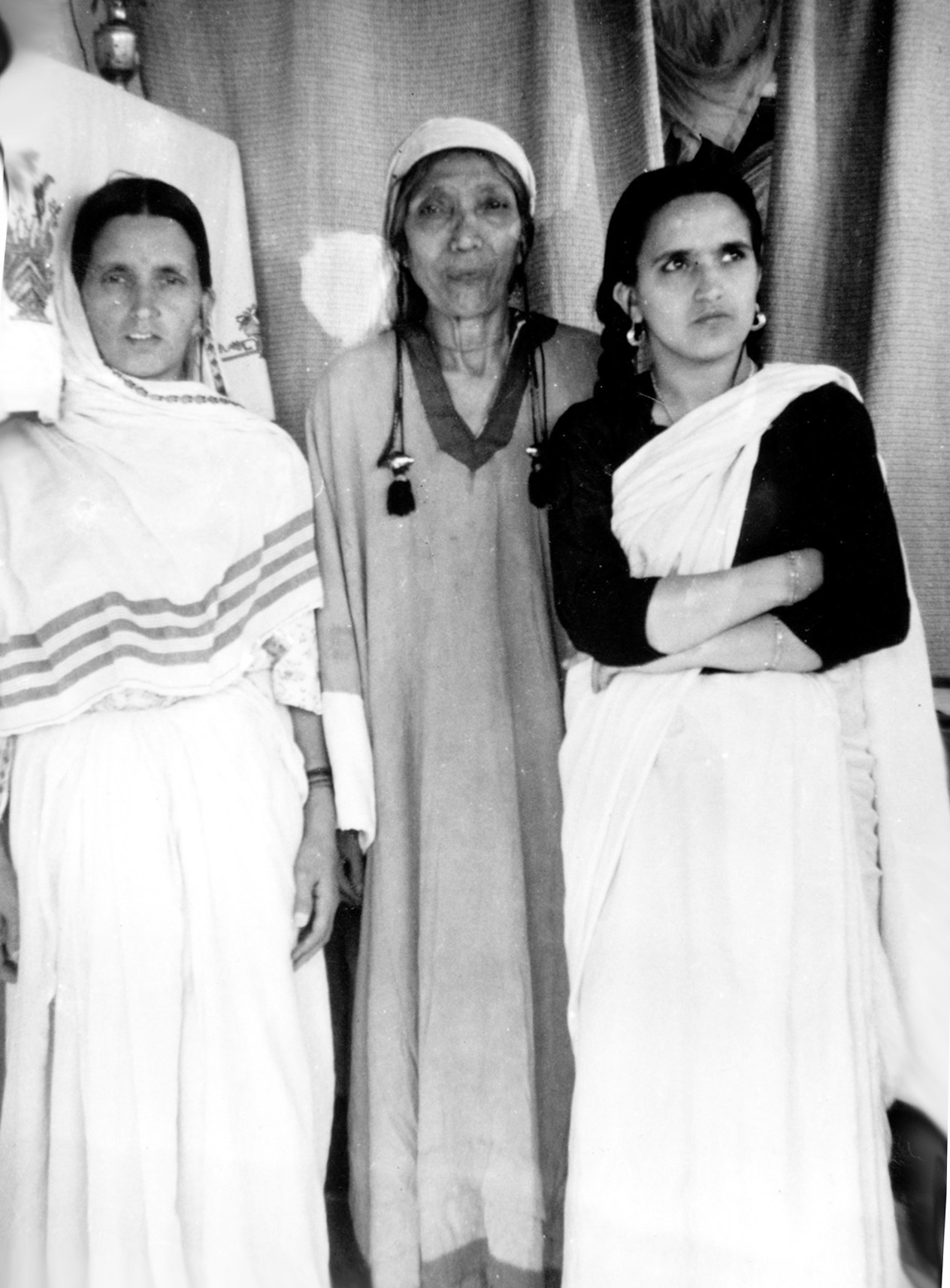 Chuni with her mother Kakni and Mother-in-law Ded And the only thing left for my parents to do now was to fix the date for wedding ceremony-a task delayed thus far due to my insistence all along to complete my Masters first. Now that my studies were disrupted, though temporarily, the parents did consult the family astrologer and a date was decided upon. To my good luck, however, the events took a sharp turn at a time when my parents were about to convey the date of marriage to the parents of the girl. A colleague of my father, Ramji, appeared on the scene with a new proposal. It was a crucial moment for my dad who, by all standards, was quite orthodox and even conservative to a point. But, obsessed as he was in his love for me, he would not miss an opportunity to steer me out of my predicament. That explains why he took the unusual step of calling me to his chamber to take me into confidence about the new proposal, a rare thing for a parent to do in those times! Face to face, he said," my boy, I know you are not happy with your mother's choice. Now that a fresh offer is in hand, I would like you to see the girl and satisfy yourself before I can take a decision on the next move." Father went to the extent of suggesting a way out. He said: "Since a formal meeting in the prevailing social milieu is unthinkable, the sympathetic father suggested me a way out and said you could see the girl in a casual manner on her way to college." I seized the god-sent opportunity and plunged into action as if I had to go to a battlefield. Only the next day, I succeeded in spotting the girl while she was on her way to the college along with her cousin sister. The moment I saw her, what attracted my attention was her unusually long silky hair, literally touching the ground, and sweeping in its wake the dust on the road as she walked along gracefully. I made up my mind; I did not waste any time in reporting back my approval to my dad. He, on his part, acted equally swiftly in taking a unilateral decision in my favor. To this day, I admire father's enlightened approach and for such a bold and courageous act. The move expectedly created a stir both at home and in our immediate social circle. Dear Mom felt sorely distressed. Accusing fingers were hurled at my dad for disregarding the long-standing commitment. We were put on defensive. The poor girl was heart-broken. She tried to commit suicide by consuming poison but timely intervention by her elder brother saved her life. I heaved a sigh of relief, for if anything would have happened to her, I could not have excused myself all my life. At this distance of time, I do realize that I was the 'villain of the piece', and was entirely responsible for the pain inflicted on the girl for no apparent fault of hers and for all the embarrassment the two sets of parents had to face. However, time proved the best healer and "K" got happily married.. And long after the dust had settled down and both of us had even married our children, destiny brought us face to face almost fifty years later as neighbors in a newly-established colony in Delhi. |
Nuptial KnotFor me, the wedding bells finally tolled on November 1, 1947, at a time when tribal invasion on Kashmir from across the border had assumed ugly proportions. The Indian army was fighting the invaders barely 4 to 5 miles away from the venue where the auspicious wedding ceremony was performed. Nuptial mantras were being chanted amid the sound and fury of the exchange of gunfire between the Indian troops and the Pakistani invading forces. Since the invaders had plunged the war-torn city of Srinagar into complete darkness by snapping the supply of electricity from its source, the Mohra Power House, we had to spend our first-ever night together under candlelight in which we were hardly able to recognize each other's faces. Yet, the night was blissful inasmuch as it transformed our solitude into unforgettable moments and filled the recesses of our hearts with lots of love and ineffable joy. For the newly-weds like us, it was a romance on the battlefront. There was no honey nor any moon, for the night belonged to the dark half of the lunar month when moon rises in the sky for an insignificantly brief period. Of course, one could not think of going anywhere for honeymoon in the then prevailing political situation when the two newly independent States of India and Pakistan were locked in an armed conflict following the uncalled for tribal invasion on Kashmir by Mohammed Ali Jinnah. |
Fly to DelhiWithin two weeks of my marriage, I left Srinagar for Delhi, alone as my better half had to complete her 4-year Bachelor's course in a local college in Srinagar. I availed of a free passage to Delhi in one of the Indian Air Force planes returning to the Indian capital without any personnel on board after bringing in military reinforcements for ground troops engaged in war with Pakistan on the soil of Kashmir. For me, the opportunity was God-send for two reasons: one, I wanted to visit Delhi at the earliest to seek work, now that I was a family man, and two, the first-ever travel by air was an exciting prospect. 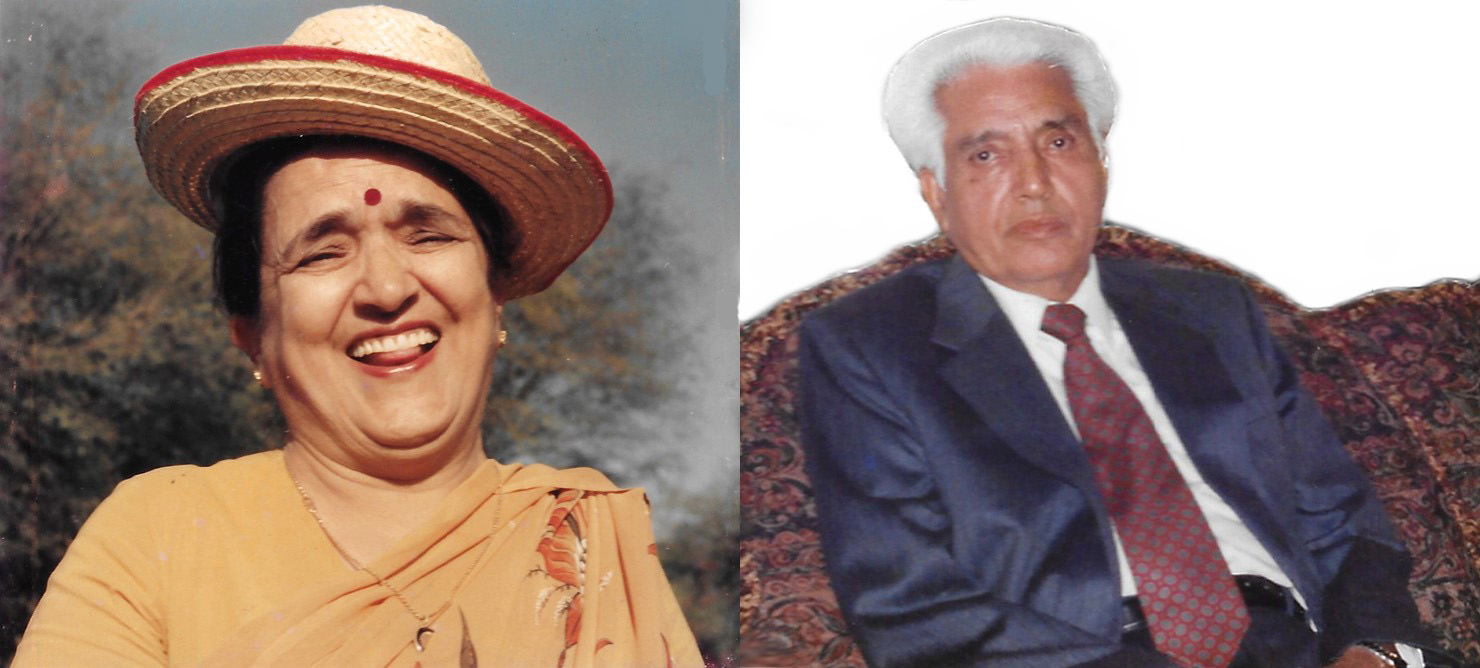 Papaji and his wife Chuni The picturesque city of Delhi with its wide, tree-lined avenues, parks and gardens fascinated me. I had read about the city's hoary past. It was capital of the Pandava kings and was known as 'Indraprastha' during the legendary times of Mahabharata. As could be expected, I spent the first few days of my stay in Delhi in sightseeing, including a trip to Agra, the city of the Taj, one of the world's seven wonders. |
My LoveIt was on December 7, 1950 that my dear wife, Chuni, finally joined me, a little more than three years after our marriage. The only link between us during this long period of separation was provided by the exchange of love letters (hers outnumbering those of mine). 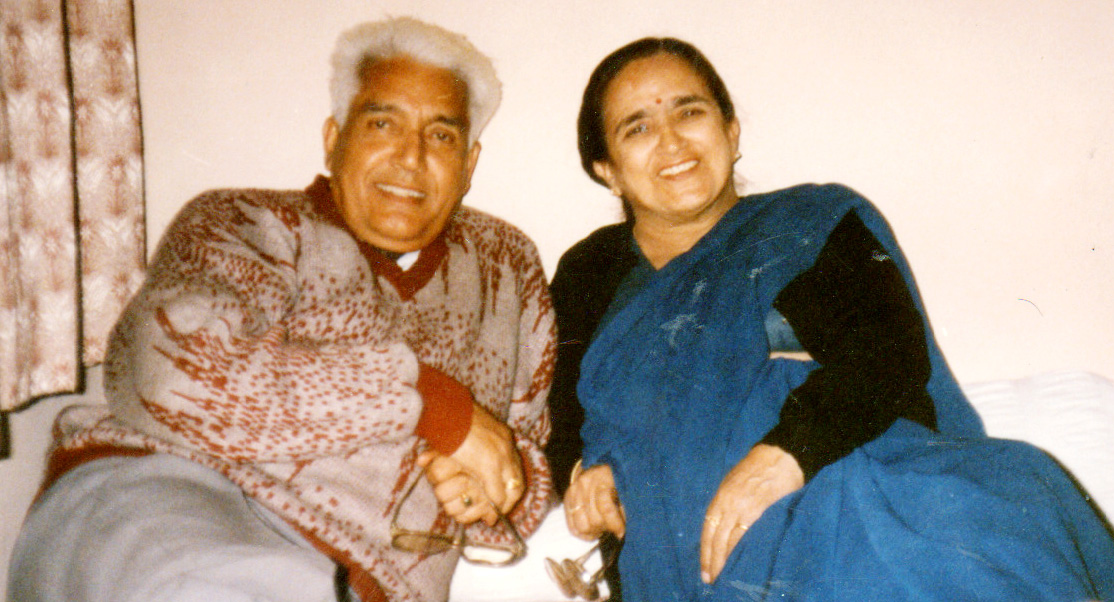 Papaji with his wife Chuni in Delhi 1987 I had a lot to tell her about myself, good, bad and indifferent. Knowing too well that she possessed a serene and sober temperament, I blurted out more than was perhaps necessary. But, the way she reacted to my occasional failings revealed the breadth of her mind and the nobility of her spirit. Her magnanimity overawed me. I soon realized that her beauty was not limited to the long silky hair that had infatuated me when I had seen her for the first time three years back, but it lay in the virtue and purity that surrounded it. I cursed the dark night of our first meeting after marriage that had hidden from my eyes not only the chiseled contours of her beautiful physical frame, but also the intensity of her love and sincerity of her heart. A woman of few words, suave and unassuming, Chuni was quite affectionate, genial and friendly. The sweetness of the soft words that usually trickled down from her red lips was music to the listener. One could not encounter a more warm and kind-hearted person. She did not bear any malice against any one, including her detractors. She always wore a benign, winsome and magical smile on her face. No one would go away without being touched by the innocence of her soul. While she possessed a sophisticated temperament (she would in normal course change three times a day), a dignified and graceful demeanor, she was so simple, so polite and so humble. With an eye for the elegant and the beautiful, she was fond of good dresses. She had a marked weakness for sarees. Purse permitting, she would often go in for new varieties and fabrics available in the market. She had a passion for cleanliness and could not stand any sort of dirt, whether of body or mind. Meticulous to the core, she abhorred lethargy. A strong believer in action, she planned her activities well in advance. In personal dealings, she was upright and honest. A great lover of nature, of trees, plants and flowers, roses in particular, she would be seen watering the plants in her backyard even in failing health during the last few months of her life. Orthodox and deeply religious, she took great interest in the study of holy scriptures, the Bhagwad-Gita, the Ramayana and the Mahabharata. Swami Vivekananda's writings made a great impact on her thinking. The advent of the saint of Shirdi in our lives in 1962 gave her life a new meaning and a purpose. She started keeping fasts on Thursdays which continued almost till the end of her earthly sojourn. Imbued with a strong aesthetic sense, she was extremely sensitive to good music, both light and classical. Among the contemporary vocalists, the late Kumar Gandharva claimed her greatest attention. All work would stand still when he would be on audio or video. She would avidly listen to good filmi and non-filmi music, ghazals and bhajans. Meaningful lyrics like those of Kavi Pradeep would send her into ecstatic mood. The songs of Meera and Kabir, couplets of the sage-poetess of Kashmir, Lal Ded, and of sufi poets and saints, Sai bhajans, the musical rendering of Ramcharitmanas and the hymns of Sikh Gurus formed almost a regular part of her food for soul. Her quiet nature and sober temperament, that had inspired awe and respect for her at college, rendered our married life very happy and blissful. Both of us cared a lot for each other. Not that we would not differ, rarely though. Mutual understanding, accommodation and adoration characterized our relationship. She never swerved an inch from what I said and wanted; she never allowed suspicion to make a dent in our relationship. Implicit trust in me was her watchword. Being one of the few educated women of her time, she wanted to pursue a teaching career, but preferred to be a house-wife and a dedicated mother to respect my views at that time that a woman need not take up a job at the cost of children and family. A pious, cultured and a gentle soul, she was an epitome of fortitude and forbearance. Her philosophic composure, wise counsel and calm and cool disposition invariably proved a source of strength and inspiration to me in the hour of strain and stress. Her untimely death due to cancer broke my heart and affected my poise. I literally gave myself up to dismay and despair and for days together, I would retire to my room, ruminate and quietly shed a tear or two. Every morning, I would take a sheet of paper and stare at it throughout the day with a brief interval for lunch. So vacant was my mind that when evenings would come, the sheet of paper would still be blank. And this state of affairs continued for nearly two months before I penned down the agony and anguish of my grieving heart in an open letter in her name. That was simple prose. It was only about five years later that the poet in my grandson, Nihar, gave my feelings a genuine poetic expression when he wrote his first-ever sonnet on Time: "Why did you have to leave me stranded here? Why did your life, your each breath cease? Your memories make me feel you're still here, Calming my heart day by day to its ease. Sometimes these memories make me weep! Sometimes I think about you in my sleep." The sonnet has since found its way into the Anthology 2000, a publication of the International Library of Poetry in USA. |
ProgenyGod in His Infinite Mercy blessed me and my wife with five lovely and affectionate children, three boys and two daughters. Late in my life when I was 78, God gifted me a sixth child, a spiritual daughter. |
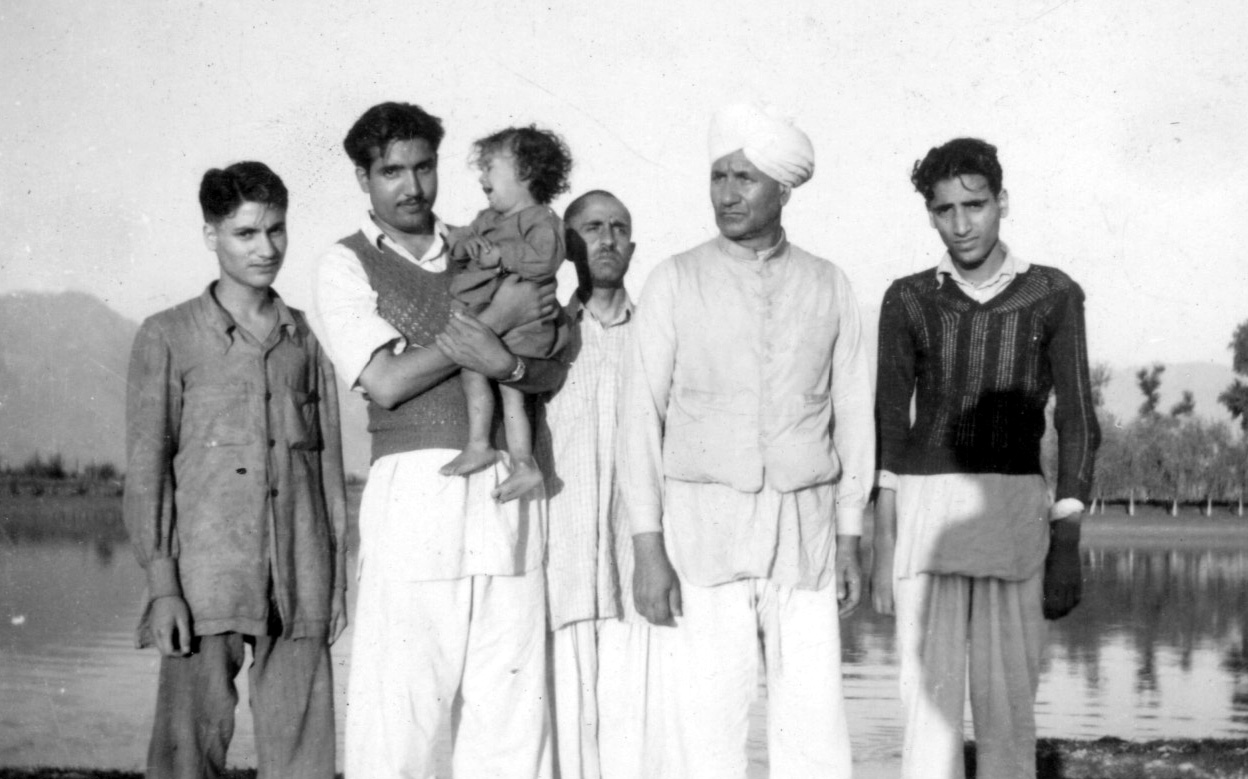 Papaji with his 1.5 year old son in Srinagar-Kashmir in 1953 |
Deepak:We had our first child, a son, on February 1, 1952, in Shimla. His name, Deepak, literally meaning a lamp, was suggested by my wife's cousin sister. Shy, sickly and temperamental, he was, indeed, our blue-eyed boy who received our best possible attention. As fate would have it, we had to make certain compromises in regard to this very child who to this day remains very dear to my heart. Deepak must have been eight months old when my father-in-law, Mr. Prakash. Ram Ganju expressed his desire to adopt him, as he did not have a male child, considered a must in our socio-religious set-up to perpetuate family name and to perform the last rites at the time of death. The request was promptly turned down for the simple reason that both me and my wife could not think of parting with any child, much less the first-born. On persistent demand, however, a commitment was made, unwillingly though, to give over the next male child. It was only five years later in 1957 that we had the second male issue.. The newborn was offered as promised, but Mr. Ganju now renewed his earlier demand for Deepak. And he solicited the support of my father in this respect, knowing well that I would not dare oppose my father's command. I tried to persuade my dad to change his stance but he argued that Mr. Ganju, being an old man, would have the satisfaction that in case he or his wife died, the five-year-old Deepak would be able to perform their last rites. I did not have the courage to go against the wishes of my father. Since it was difficult for me and my dear wife to part with our first child, for whom we had developed some sort of weakness, a compromise was worked out to solve the dilemma. Mr. Ganju agreed that after giving Deepak his parentage, he would leave him with us till he completed his studies. It ensured that we would not have to part with Deepak. And thus, while Deepak Raina became Deepak Ganju at the age of five, he continued to be with us all the while. The arrangement may have helped my wife to overcome her initial opposition to the idea of giving over her eldest son, yet in her heart of hearts she was not really happy, for she too had willed that Deepak and Deepak alone should perform her last rites. It is different that destiny fulfilled this ardent wish of hers when she died of cancer in Miami within 40 days of her coming to see Deepak's family. Excellent at studies, Deepak got scholarship from the 8th standard itself. He graduated from High School with distinction, earning a National Scholarship from the State government for five continuous years of his Bachelor of Engineering (Honors) course at the Birla Institute of Technology & Science (BITS), Pilani, in the northern Indian State of Rajasthan. BITS is an affiliate of MIT, USA. His extra-curricular activities at Pilani included direction and acting in several award-winning plays in inter-University competition. He began his professional career in 1974 in Rallies India, a top engineering concern in Bombay. He moved to Delhi in 1976 to join Engineering Export Promotion Council of India. Later, he set up his own manufacturing unit in Kashmir not long after his marriage to a pretty girl, a law-graduate from Kashmir. Deepak is now running his own company, NNI International dealing with fire protection products. Deepak and his wife, Chandra, are now settled in Miami, Florida, USA. They are blessed with two highly talented, intelligent and beautiful children, Neha and Nihar. |
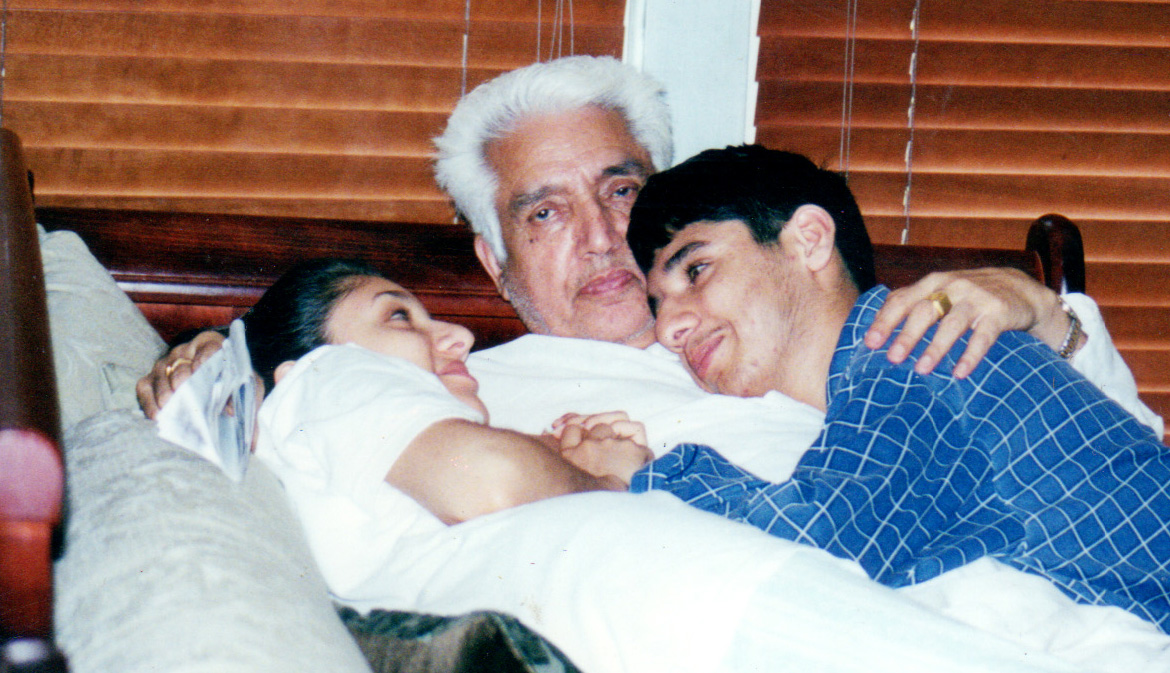 Papaji with his grandchildren Neha and Nihar in 1998 |
ReetaThe second child, Reeta, a daughter, followed only a year later on February 14, 1953, to be exact. Her birth took place in Srinagar where my wife had gone for delivery with a purpose. It was to fulfill our commitment to Mr. Ganju and hand over the offspring immediately at birth in case it happened to be male. But fate had decreed otherwise. Quite intelligent, hardworking and sober, Reeta was good in both studies and sports. She passed out Bachelor of Science from the University of Punjab in 1972. An avid hockey player, she represented her college in Shimla in inter-college hockey competition. Soon after her college education, Reeta had to move to Delhi in the wake of my transfer where she competed successfully in the Assistant Grade Examination conducted by the Union Public Service Examination (UPSC). And after selection, she was posted in the Central Ministry of Labour as an Assistant.. In 1976, we married her to a handsome business executive, Rajendra Kampasi. Since her husband was posted in Punjab and held a touring job, she resigned her job in the Ministry only after about three years of service. She has since preferred to be a housewife. Reeta is well settled in New Delhi with her husband and two beautiful, gifted children, Nakul and Mansi. |
RaviWe had our third child, Ravi, a son, after a gap of four years. Within two hours of the birth of this child on March 31, 1957, a Sunday, I called my father-in-law in Jammu to come over to Shimla along with his wife so that I could fulfil my commitment to give them the next male child. They did come the next day but worked their way through the good offices of my father to secure the adoption of the first-born Deepak. Quite lively, boisterous and happy-go-lucky, Ravi had his early education in Shimla. He joined college in Delhi in the wake of my transfer there. After passing out Bachelor of Commerce from Delhi, he began his career in a private concern before finally switching over to his own estate business. Ravi is well settled in New Delhi with his very beautiful wife, Suman, and two pretty, intelligent and talented children, Salil and Jigyasa. |
AditiThe fourth child, Aditi, had her schooling in Kendriya Vidyalaya, first in Shimla and later in Delhi. Quite good at studies, the cute, intelligent, lively Aditi did her Bachelors in Arts from Delhi and Masters in Economics from Himachal Pradesh University, Shimla. After doing a diploma course in Computer Application, She served a reputed private Computer concern for nearly four years before we got her married to a handsome Management Professional in Travel Business, Vipul Mahajan. She, too, is settled in New Delhi with her husband, Vipul Mahajan, and two beautiful, talented and intelligent children, Harssh and Kirti. |
AkhshayAnd the fifth and the last, Akshay, a son, had his schooling, like her sister Aditi, in Kendriya Vidyala in Shimla and Delhi. He did his Bachelors in Commerce from Delhi. Later, he also did a diploma course in Computer Software from NIIT. Tall, handsome, intelligent, Akshay began his professional career in sales at an early age. He served two reputed companies for nearly three years before he settled down in his own business. Not very long after, Akshay finally landed a Managerial job in Singers, a multi-national company. He is married to a tall, beautiful, intelligent girl, Ruchi, a graduate from the prestigious Lady Sri Ram college in Delhi. Ruchi also did her B. Ed and a course in computer sciences. She is now engaged in a teaching job. They are now proud parents of a cute, smart baby girl, Mrinalini., her household name being Meera. |
Nandita-the God-gifted-daughterGod, in His Infinite Mercy, blessed me with five children, three boys and two daughters, though I had always believed and prayed for parity of genders among my offspring, because I always relished the belief that Shiva and Parvati, man and woman are born equal. God, again in His Infinite Mercy, gifted me a third daughter in this part of the world and I must thank Almighty for gifting me a daughter so heavily talented and virtuous as Nandita. Words will fail me to adequately describe her inborn qualities-after all she is the daughter of great and gifted parents. When I first saw her in the South Florida Hindu Temple guiding its Education program, and initiating and organizing for the first time in America a month dedicated to the goddess of learning, now popularly known as the Hindu Heritage Month, I was simply amazed. And then when I saw how she excelled me even in the field I had prided to have performed so well in All India Radio and Doordarshan, I bowed myself before this earthly embodiment of Saraswati. I used to edit spiritual magazine for the Temple, called Sanatana Sandesh. I was given a write-up by her to publish by the then Chairperson of the Temple's Governing Board. I was simply impressed by the power of her pen and I requested the said Chairperson to request her on my behalf to become the Assistant Editor so that in the event of my absence on vacation to Delhi she could look after the magazine. And the first time that opportunity came in 1998, and believe me she brought out two issues of the said Journal while I was away to India and the two editions were much better in both content and design than what I had been doing. Since then she has become my Editor and I respectfully call her the Editor of Editors. I do write for various magazines even now but never does any write-up leave my hands without Nandita having a second look and it is always an improved copy that I get back. She has a penchant for writing so well and on top of it she is so well planned and organized. If I just say that she is a perfectionist, that would describe her. As far as dear Murali is concerned, he is, what I always tell Nandita, an embodiment of what we gather from reading spiritual books. He is a thorough gentleman, a wonderful human being and a great doctor. At 78, God, in His Infinite Mercy, gifted me a third daughter, perhaps, to bring parity in the number of sons and daughters as I always believed in the equality of boys and girls. Since I had wanted my first daughter, Reeta, to become a doctor, but was denied admission to a medical school in my home State at the last minute due to bureaucratic pressure, the god-gifted-daughter is a practicing neurologist. She lives in South Florida with her doctor husband and two gifted daughters. Besides, she is gifted with the power of pen, more facile and creative than this adopted father of hers. She herself has penned down the story of this adoption in a beautiful write-up in a KOA journal, Kasheer in the year 2002. Entitled "Pitr Putri Pratiti -an account of a non-Kashmiri daughter", she says: Fascination, interest, or an attraction to a culture, an idea or a thing, by virtue of association, can change with time. However, a sense of kinship that seems pre-existent can linger on and may remain inexplicable, at least in words. "Such is my "connection" with Kashmir and its people. Here, I am tempted to use the word "my Kashmir" and "my people", a part of the larger picture in "my India", on "my earth" in "my universe"! "My familiarity with the language, and customs could be attributed to childhood Kashmiri neighbors. But how does one explain the familiarity with many matters that I could never have seen or known before, and the ease in still picking up the language and most of all the recurring de-ja vu ~ a recurrent eerie feeling of things having happened before? Why do I have such a strong sense of belonging? Why does the Pratyabhijna philosophy appeal more to me than those of philosophers like Shankaracharya from my own native land? Why do Lal Ded's vakhs, Abhinavagupta's teachings and the Panchstavi seem so interesting and familiar, in my adulthood? "When such questions cannot be answered, one tends to shove them aside, perhaps a little awkward to even discuss. At times, I even tried to hide the fact that some things Kashmiri, just came naturally to me. I, loosely attribute it to my childhood Kashmiri neighbors, for lack of a better explanation. "Truth is, that while the familiarity with customs and culture, could be attributed to influences in childhood, and kindled again by reinforcement with new Kashmiri friends, much later on in life, there seems to be more to it than meets the eye! "While I could impress any Kashmiri, with my familiarity of Hayrath, Pashmina, Kangri, Varai chiv and Paadi Kammalan and Sufi mysticism..., just as much as any non-Kashmiri tour guide in Kashmir could, yet no Kashmiri man or woman I had met, could impress me with what I was perhaps in search of...philosophical discussions and answers to spiritual queries, till I got to know "my father". "It takes with one hand and gives with another. Such is "my story". My birth father was on a spiritual path as far back as I can remember and one painful day he chose to detach from all attachments and lead a solitary life of a recluse. "Years went by, but not the pain, till taking his place, came a man of his age, his thought, his broad mindedness, his interests, his principles and ideologies ~ a Kashmiri fatherly gentleman. I had worked under him for over several years, and discussed many a thing on religion , except somehow never at length about Kashmir, perhaps because first things were destined to come first! "Over a series of chance conversations, I was plainly overwhelmed when the pieces of the jig saw puzzle started to come together to make a perfect picture of not just familiarity, but a link, a bond, perhaps so innate, a connection so spiritual that only a daughter or a father can understand. Questions I had asked before seem to have slowly found its answers. I became "adopted" rather naturally and now I feel I have finally come "home". I am onto the path again of a journey with my mentor, my father ~ Pitr Putri Pratiti !(Father Daughter Faith/Understanding)" |
Proud ParentI feel proud of all my six children and grandchildren. They are nice, caring, loving and obedient. Not given to interfering in anyone's affairs, I am really happy the way they are engaged in raising their families. They have their private, personal and professional lives. Fine, as it should be. They must have an identity of their own. I always wanted them to be independent decision-makers. Now that all of them are grown-up adults, they possess the ability to discriminate between right and wrong and they will not, I hope, be impervious of their duties and obligations toward society. My advice to them is to be conscious of the human limitations and try to do to others what they expect others to do to them. They must practice 'live and let live' policy in which I have passionately believed all my life, recognizing at the same time psychological differences of temperament, outlook and approach. |
Abortive CareersI did not straightaway get to what I did during my career, nor did I stay the straight path always. There were opportunities that I attempted but did not fully avail. |
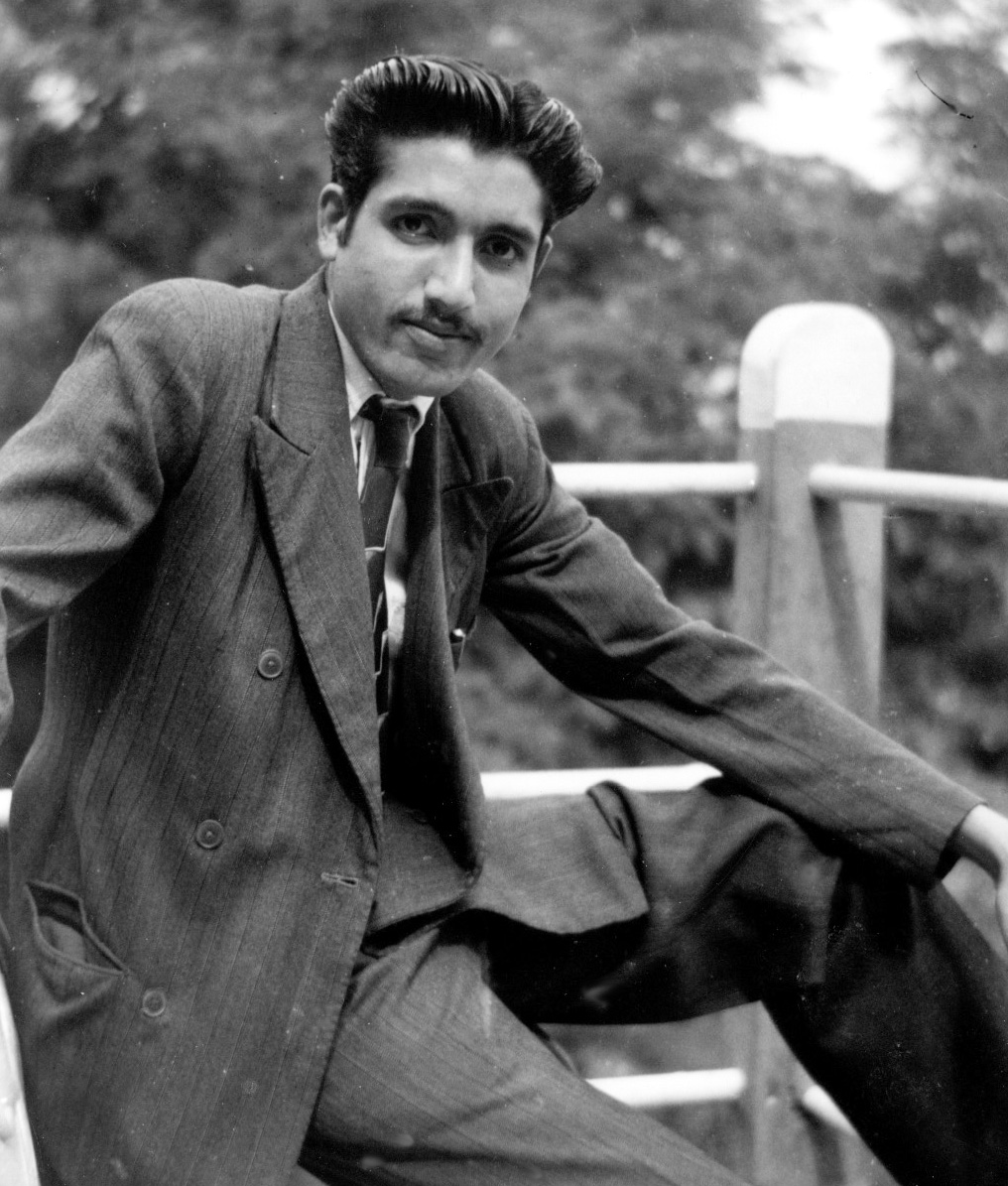 Papaji In Shimla 1950 |
|
A)After having been registered by the University of Punjab as a Research Scholar in early 1960, I was invited as a delegate to the annual Indian philosophical Congress held later that year in Chandigarh, the capital city of Punjab, in northern India. On the second day of the session, I presented a paper on the "Concept of good and evil in Sri Aurobindo's thought" which was very well received.
At the conclusion of the Congress, I was offered the job of a lecturer in Philosophy in Punjab University. The offer was made by Dr. Prem Nath, the then Head of Department of Philosophy at the University. However, I did not accept the offer after weighing the expected emoluments in the proposed job against the total emoluments I had been drawing in All India Radio at that point of time. Only six months after my hasty, impromptu decision, the University Grants Commission revised the grades of Lecturers, Readers and Professors to make them really attractive. Strange are the ways of destiny. This was the second time in my life that a decision was taken not on merit or long-term perspective but purely on instant economic consideration. The first time I quit the highly prospective job in The Hindustan Times in March 1848 for immediate monetary gains and for security of government service. I regret both the decisions as they were not well thought out. |
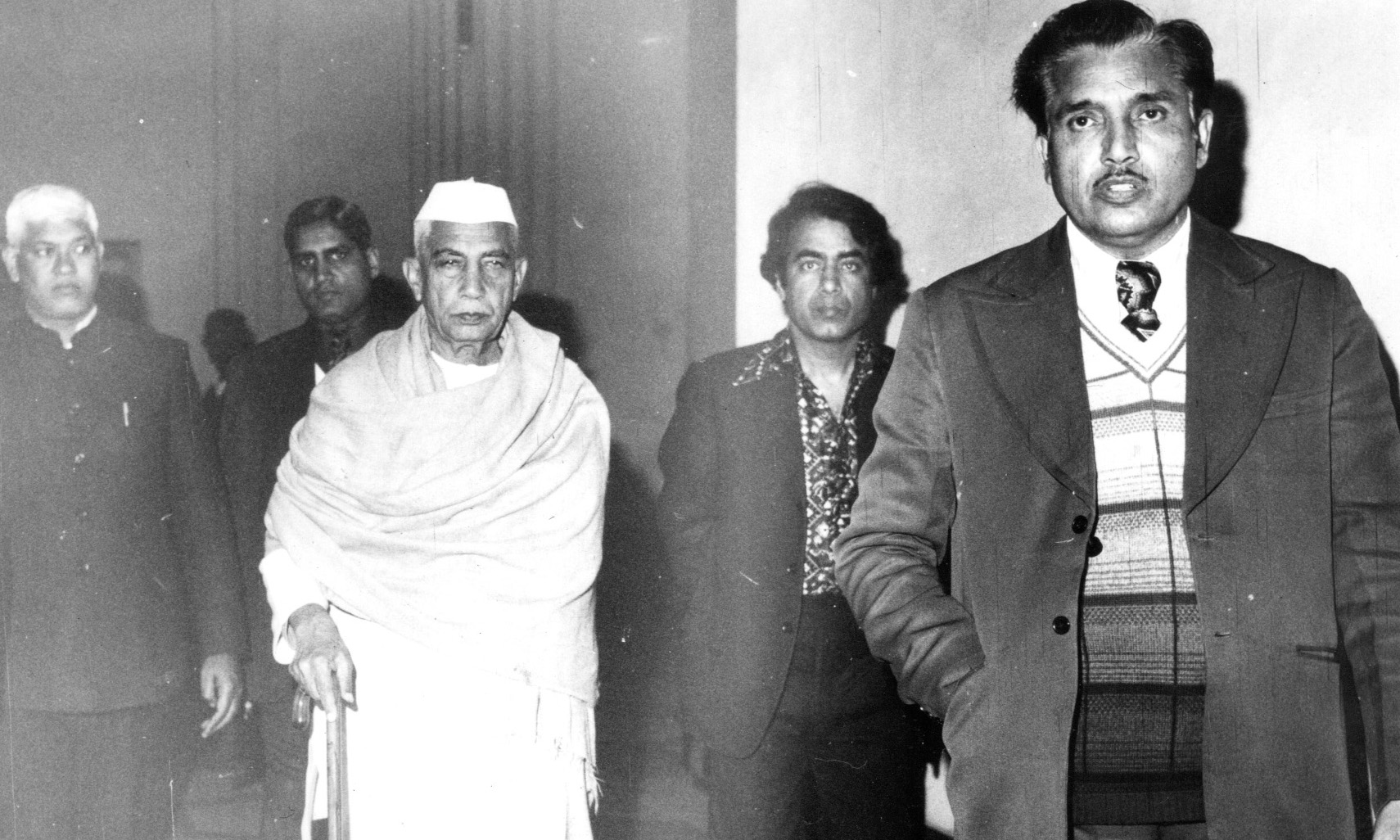 With Ch. Charan Singh |
|
B)The Academic Council of Punjab University, at its meeting held on March 26, 1960, approved my candidature for the Degree of Doctor of Philosophy in the Faculty of Art. The subject of my proposed thesis was the "Concept of Human Ideal in Modern Indian Thought".
The synopsis presented to the Council was supposed to include chapters on the philosophy of the following contemporary thinkers and philosophers: Gandhi, Tagore, Aurobindo, Iqbal, Radhakrishnan, Krishnamurthy and Dasgupta. It also had a few more chapters dealing with the reform movements like those of the Brahmo Samaj, the Arya Samaj, the theosophical society and the Ramakrishna Mission. Treated as an Internal candidate, I was to submit my thesis in three years' time. But, something happened just before the stipulated time for the submission of my thesis. In the fall of 1962, the University Academic Council conveyed me their decision that I should also include in my proposed book a chapter on the well-known contemporary Punjabi poet, Bhai Veer Singh. I had great respect for the great poet and in fact I had even thought of him in the first instance but had dropped the idea because I knew I would not be able to do justice in view of my inability to understand the Punjabi language. There were no English translations of the poet's works available at that time. After careful thought, I rejected the Academic Council decision on two counts: 1) I had already finalized the framework of the proposed thesis and any intrusion at that advanced stage of my research would have disturbed its even tenor. and 2) I knew very little Punjabi to do justice to the Punjabi poet's thought. The Academic Council was accordingly informed. I pleaded for their reconsideration. They did not relent. And so did I not, leaving me with no choice but to voluntarily snap my ties with the university. |
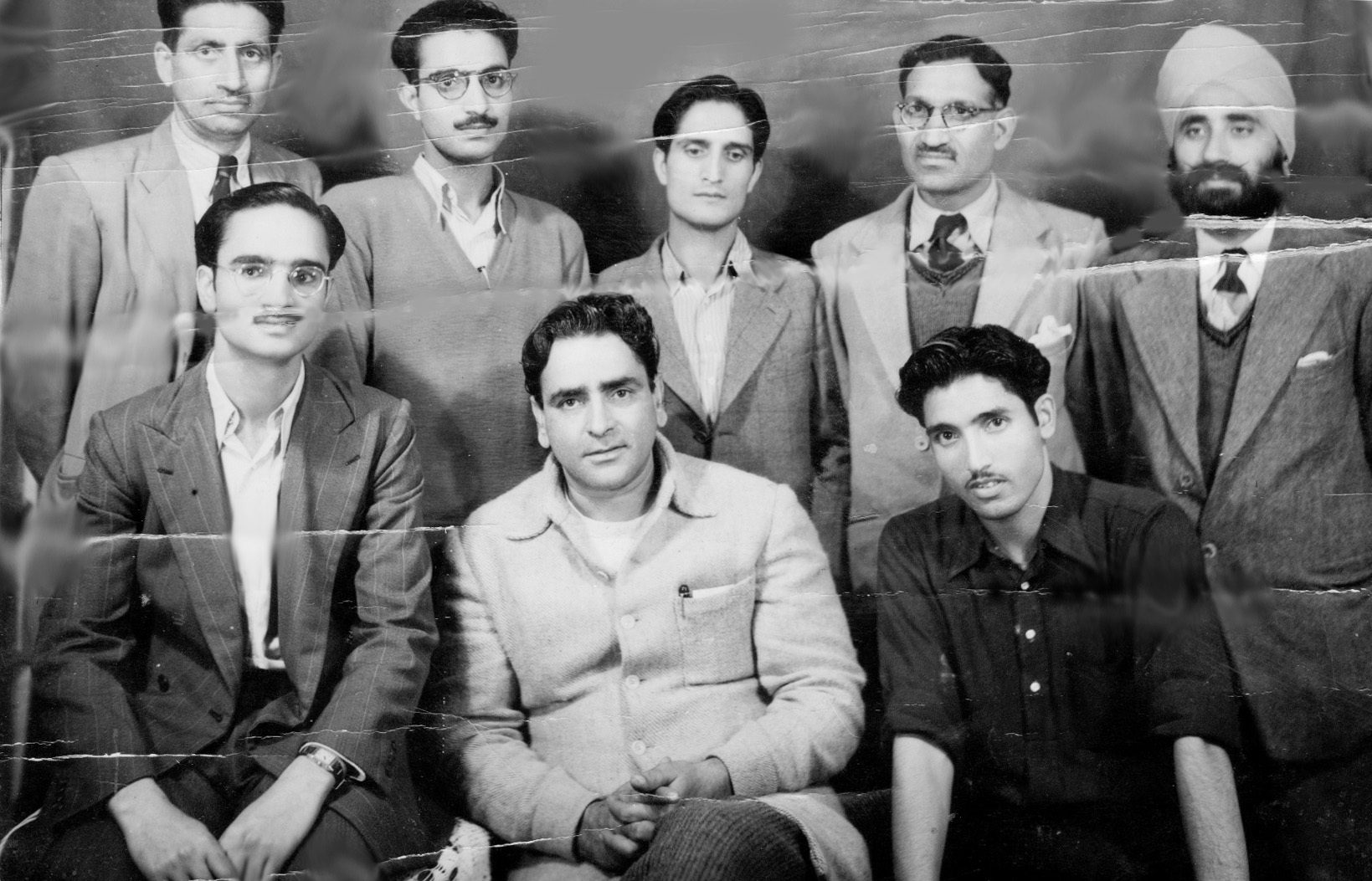 Papaji with PrithviRaj Kapoor 1950 |
|
C)The veteran stage director and actor, Prithvi Raj Kapoor, was in Shimla during the summer of 1950 giving performances of his famous stage play, Pathan, at the city's well-known Gaiety Theatre. I had the good fortune of being introduced to the doyen of Indian stage and cinema by a common friend, Harbanslal, at one of the Pathan shows. Sensing my interest in acting career, Prithvi Raj Kapoor asked me if I would like to join his theatre company. "Yes", I said, adding that "a career in films holds greater appeal for me." Perhaps to see for himself whether I possessed any histrionic talent, he asked me to deliver a dialogue he gave me in writing. I took five minutes to compose myself and rehearse the dialogue. Highly impressed by my delivery, he promised to find for me a berth in films.
In a few days time, Prithvi Raj contacted his close friend, film-director Mehboob, who was in search of a new face. I was asked to send my bio-data along with about 30 snaps in different poses to Mehboob. Two months later, I was offered a role in one of Mehboob's new ventures. A service contract with a monthly salary of Rs. 800/ per month was sent to me for confirmation in the month of July, 1950. Those were not the days of one-time contracts or of fixed amounts. I accepted the offer and started preparations to leave for Bombay. I decided not to inform my wife and parents before I could really settle down in Bollywood. I took three month's leave from my office with the option of extending it further, depending on how the circumstances would shape in an entirely different environment. Rail reservation for Bombay was booked in advance and I was scheduled to leave on August 20, 1950 to take up the acting assignment with Mehboob Films. But, as they say, man proposes and God disposes. This age-old axiom proved its veracity in my case. On the eve of my departure for Bombay, I went to my bank in Shimla, "Imperial Bank of India" (since renamed as The State Bank of India), to withdraw sufficient funds for my initial expenses for board and lodge in the big Bombay city. To my great shock and utter dismay, my bank balance showed just Rs. 60 in my account, whereas my records and the bank receipts of deposits indicated that the balance should have been to the tune of Rs 3,500. I reported the matter to the Manager (called Agent in those days) of the Bank. He called the police to initiate a proper inquiry. The police went into action. They registered a case of embezzlement and the Bank immediately suspended the counter-clerk and the disbursing officers for having passed the check for payment without properly verifying the signatures. My departure for Bombay was delayed, if not shelved, beyond my control. The police wanted me not to leave the city till the case of embezzlement had been solved. I was legally bound not to move out of Shimla. The police case lingered on for nearly one year and by the time the police proved that my signatures had been forged and money embezzled, it was too late for me to go to Bombay. Poor director Mehboob who had been informed about my predicament did wait for nearly six months for me to join. But there was a limit for him to start working on his new film. Exhausting the limit of his patience, he had signed a new face in my place, I don't exactly know who it was. But for me it was all over. Though I had intended to keep my visit to Bombay a secret, at least from my wife and parents till the time I would feel secure in the career I had chosen to pursue, the news had leaked out to my family members back home through friends and colleagues. As soon as my parents got the scent of it, they dispatched my wife to Shimla. By then she had completed her Bachelors with Mathematics as one of the major subjects. |
CareerMy professional career spanning 35 years from March 15, 1948 to July 31, 1983, could not follow a fixed life-style simply because the duty hours were not normal. It was not a fixed 7-hour daily schedule from 10 am to 5 pm. It used to be either 3pm to 10 pm schedule, or from 9 pm to 4 am schedule or from 3 am to 10 am. Rarely it would be 10 am to 5pm.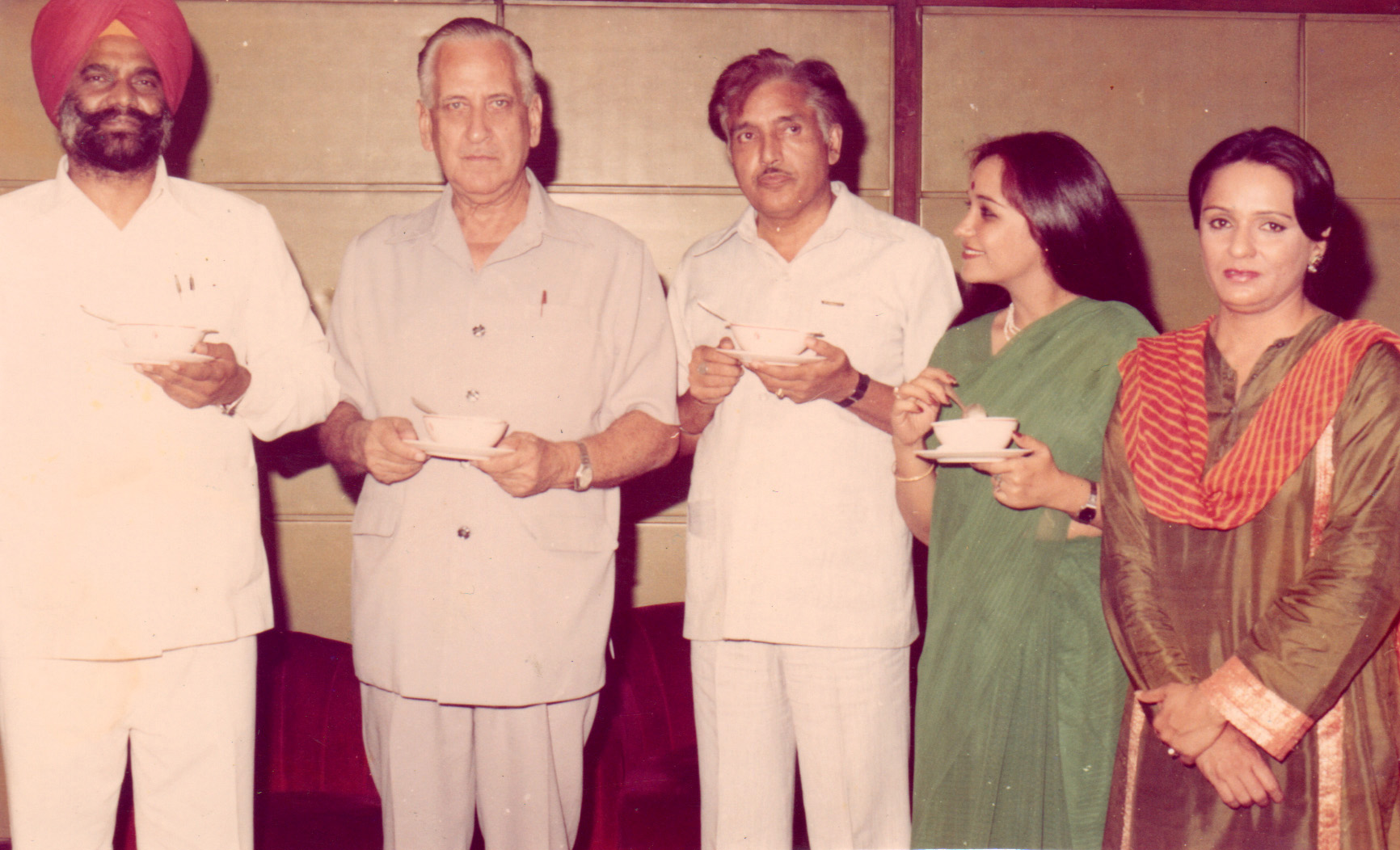 With famous Indian radio broadcaster Melville de Mellow and Pamela Singh and Sports Minster Buta Singh during 1982 Asian Games But various assignments, like those of a Monitor, a Sub-editor, an Editor/cum/Correspondent, in charge of AIR's prestigious daily Spotlight and weekly Current Affairs Porgram in which not only the media greats like Girilal Jain, Inder Malhotra and Devdas Gandhi, like Editors of leading Newspapers but most of the government Ministers and well-known analysts and defence experts would take part daily. It led to action and interaction with leading ideologues from whom I could not but learn the basics of life patterns in various fields, cultural, social and economic fields. My professional life proved a school of very high learning. Once retired at the age of 58 on July 31, 1983, I could adopt a regular life style that included early rise from bed to not really early going to bed. But did ensure at least 6 to 7 hours of sleep. I Join HT February 1, 1948, the day after the cremation of my idol, I met Devdas as scheduled. He had just finished his lunch. We talked about partition of the sub-continent and its aftermath. Hardly had we talked for about 20 minutes when he asked me to join his paper as an apprentice sub-editor. I couldn't believe my ears. 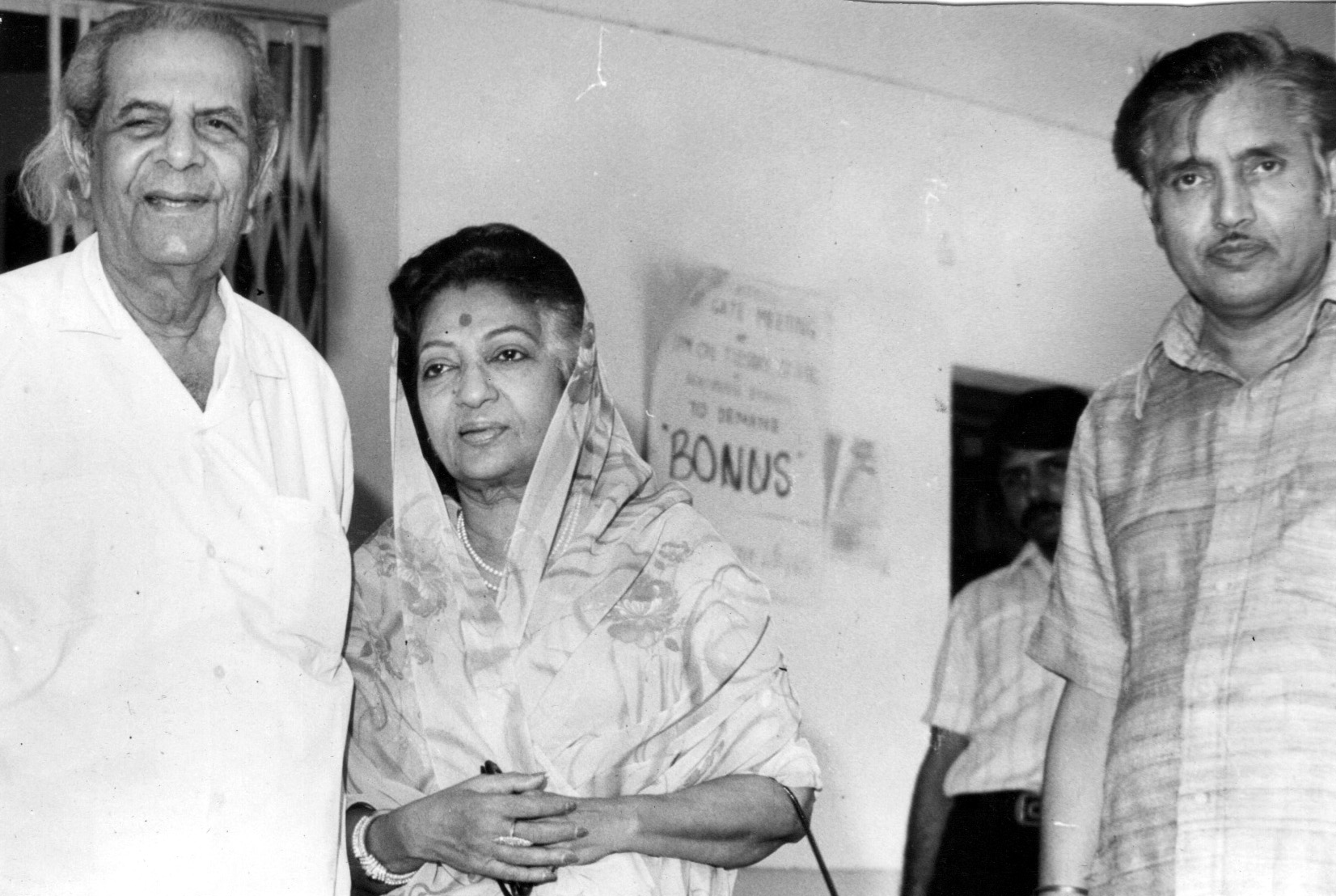 With Actor Sohrab Modi 1965 I was attached to the Editor-in-Charge of the daily for the first few days. Once he was satisfied that I had picked up the basics of newspaper journalism, I was put on reading proofs. I found the job exciting, for every minute news reports about happening in the world trickled in from all over the globe. Since I hailed from Kashmir and was, perhaps, supposed to have a better understanding of the situation in Kashmir, I was put on the job of scanning reports on Kashmir from the United Nations headquarters. I really enjoyed my work. My stint with the newspaper, however, did not last long, not because the management did not want me any more but because I decided to quit in favor of what, to me, looked a better offer at that point of time. |
|
Crucial Decision
All India Radio communicated to me officially the result of the test I had taken on the day Mahatma Gandhi attained martyrdom. I had topped the test and was, therefore, called for an interview in the first week of March 1948. Within minutes of the interview, I was handed over the letter of appointment for AIR's Shimla office. |
|
At Shimla
The 23-year-long stay in Shimla was, perhaps, one of the most satisfying and rewarding periods of my life on both personal and professional fronts. |
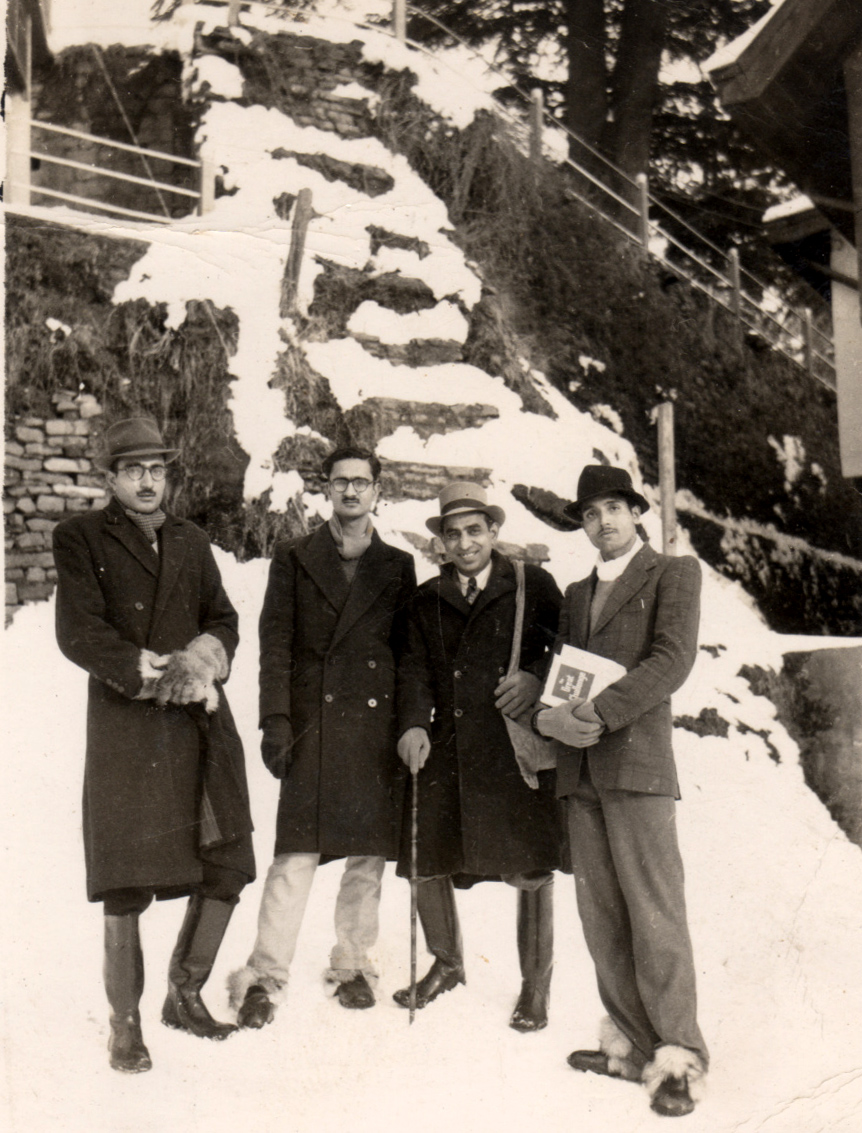
At Shimla
|
|
AIR Monitoring Services, which I joined on March 15, 1948, was set up in Delhi in the November of 1939 soon after the outbreak of World War II. As a branch of the Military intelligence, its main function was to keep a security check on news, talks and features broadcast by German and Italian broadcasting organizations, and to pass on the monitored material to the Counter-Propaganda Directorate for necessary refutation and rebuttal. This nucleus unit was shifted from Delhi to Shimla on March 3, 1940 in view of the better quality of reception at a higher altitude. Its administrative control was transferred to the Department of Information & Broadcasting in 1941.
After the partition of the Indian sub-continent, Monitoring Services continued to perform the role of a watchdog for Government of India by listening into news and commentaries broadcast by world stations. The task of sifting grain from the chaff was normally assigned to professional men, called Monitors, equipped with adequate knowledge and experience. I had the good fortune of being the first to be selected for the newly-created post of a Monitor in Kashmiri language to keep a close check on the malicious anti-India propaganda by Pakistan after it had forcibly occupied a big chunk of the Indian State of Jammu & Kashmir. Initially, I was assigned to monitor Pakistani broadcasts--news, commentaries and features--directed to the people of Kashmir, and report on the goings-on in Pakistan. My reports based on monitored broadcasts helped our policy makers take important decisions In course of time, when I became an editor following an open selection by Union Public Service Commission (UPS) for recruitment to the Indian Information Service (I.I.S.), I got lot of opportunities to analyze reports based on monitored Radio broadcasts in different languages from all over the world. My assessment of the political upheaval in China, and of the strained relations between China and the Soviet Union earned outstanding reviews and were extensively made use of by the External Affairs Ministry, Government of India. I still have in my personal record a communication from India' Foreign Secretary in 1970 conveying his Ministry's gratitude and appreciation for the said reviews. I was transferred to the News Services Division (NSD) of All India Radio, New Delhi in April, 1971, within months of my elevation to the post of Assistant Director in the Monitoring Services, Shimla. I had not to wait long before my nose for news, experience and talent was recognized in the New Delhi office where round-the-clock news bulletins in English and various Indian and foreign languages were produced for broadcast to every nook and corner of India and the world. |
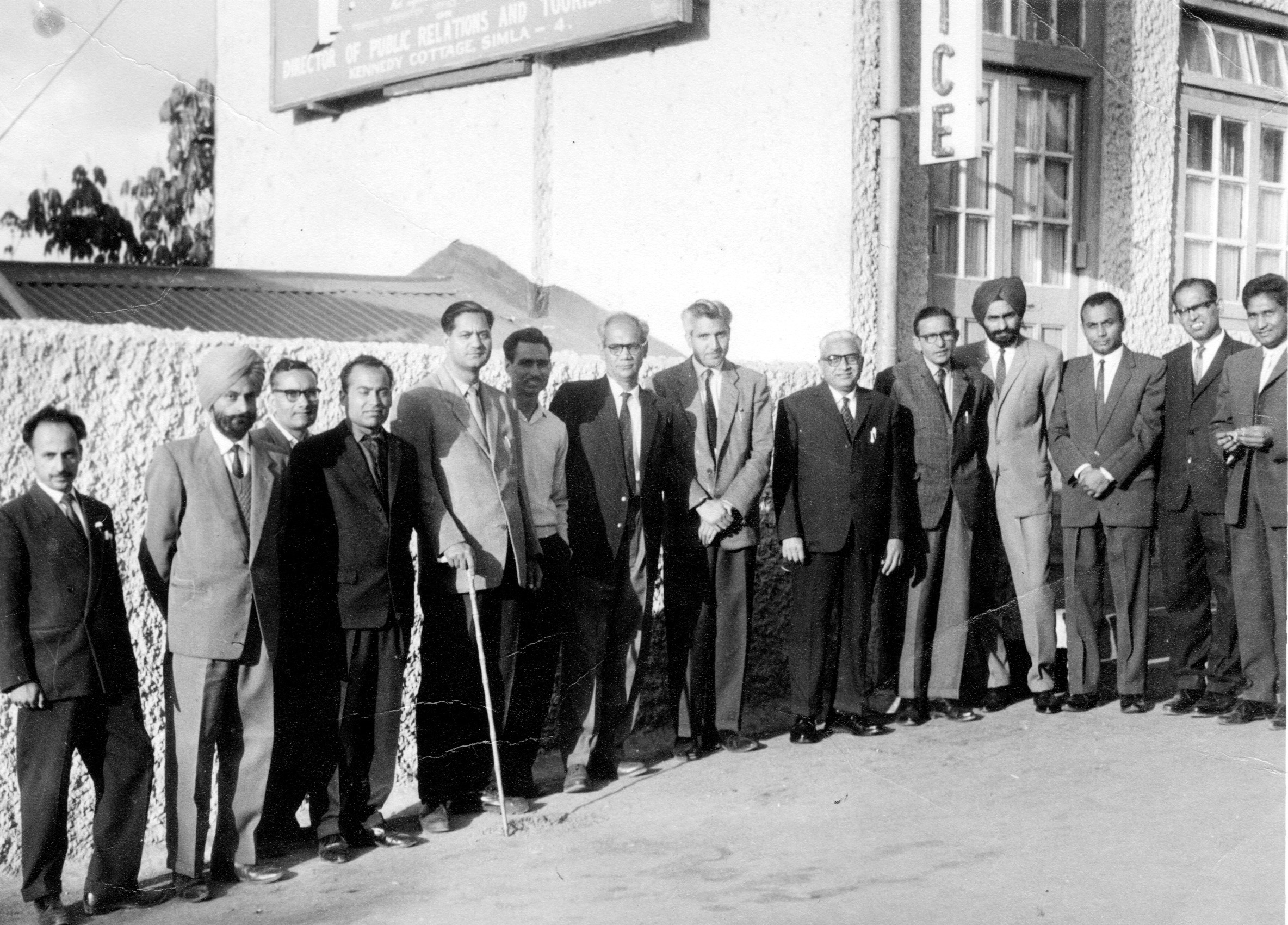 Group Photo of AIR Monitoring Staff at Shimla in 1965 |
|
I beat the clock
It was, perhaps, my third day of duty in NSD, when General Yahya Khan, the then Pakistani President, addressed his nation at 1900 hrs. on April 16, 1971. In his 30-minute broadcast, the Pakistan President poured out venom against India and raised several contentious issues. A 36-page transcript of the said broadcast was made available by the monitoring unit at about 2000 hrs. out of which a 1-page news story had to be prepared for the national news bulletin scheduled at 2100 hrs. Senior editors along with the Director and Joint Director of News Services Division joined hands to do it. Time was running out; and the editors were still struggling at 2030 hrs. |
|
Special Assignments
I did not look back after that. Coincidentally, my very name was identified with the place where news bulletins were prepared. GNR. (Gopi Nath Raina) in GNR (General News Room), colleagues would often tease me. |
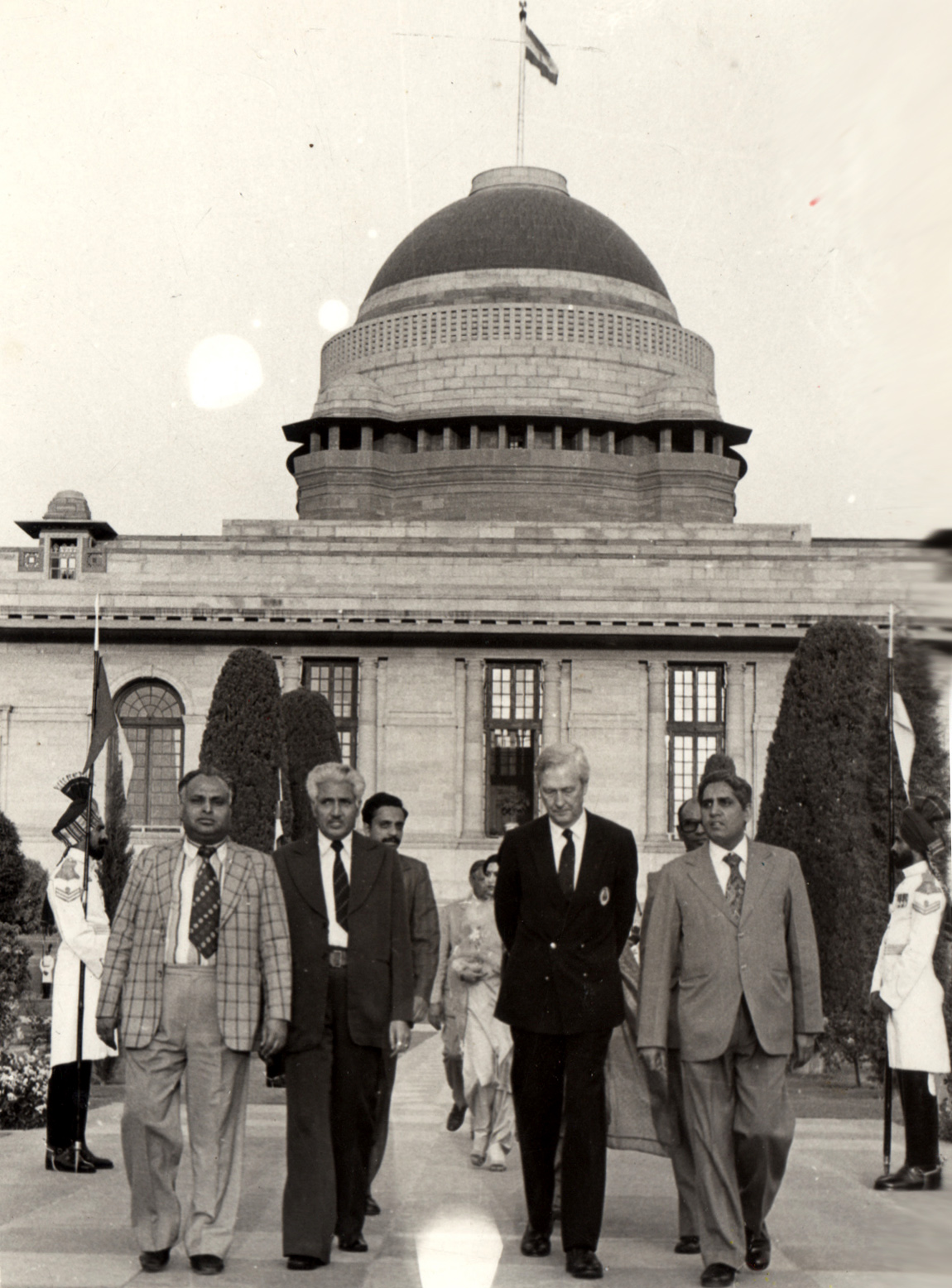
Papaji at-Rashtrapati Bhawan in Delhi
|
|
Even though I was relatively junior, top assignments, normally the preserve of very senior editors, came my way. For nearly 12 years, I produced not only prime-time news bulletins, but also the prestigious programs like Radio Newsreel, Spotlight and Current Affairs discussions on issues of national and international importance. The job requirements involved, among other things, liaison with the editors of leading newspapers, prominent columnists, political analysts, economists, financial experts and university professors to persuade them to write on topical subjects for AIR network. Whenever a subject-specialist was not available, I would write commentaries myself.
I was the first editor in the history of AIR newsroom to be deputed as a special correspondent to cover very important events. In 1972, I visited Indo-Pakistan border in Chhamb-Jaurian sector in Pakistan to report on the withdrawal of Indian troops from the Pakistani border in the wake of 1971 Indo-Pakistan war. I also covered the then Prime Minister, Morarji Desai and Foreign Minister, Atal Behari Vajpayee's visits to Nepal in 1977, and to the United States, Britain and Brussels in 1978. Again, I accompanied the then Foreign Minister, P.V. Narasimha Rao on his visit to the Soviet Union in 1980. My dispatches on the outcome of the visits were broadcast in the main news bulletins and in the spotlight programs. Besides my regular job with the electronic media, I had had the privilege of editing the only Defence Journal in the Indian capital, VIKRANT, for nearly three years. I also wrote film reviews for one of the leading film magazines in New Delhi. In 1981, I was specially deputed to co-ordinate the publicity network of the 9th Asian Games held in Delhi in November, 1982. As Deputy Director of Publicity, I was responsible for feeding the print and electronic media the latest reports on the build-up of infra-structural facilities for the Games. My reports on preparations for the 9th Asiad appeared in all the national newspapers in the country and their translation was carried by all the regional newspapers. I also worked as Press Secretary for the 86th session of the International Olympic Committee (IOC) held in New Delhi in 1983. |
Congress VarnikaWithin two months of my retirement from the Indian Information Service (I.I.S.) in August, 1983, my professional services were requisitioned by the then Prime Minister, Indira Gandhi, to help her start publication of an official journal for the ruling Congress Party at its headquarters in New Delhi. I took over as Executive Editor of the proposed bi-lingual monthly, VARNIKA, in November, '83, and its inaugural issue was released by Prime Minister Gandhi in January, 1984. I remained its editor till the closure of its publication in 1990 by Prime Minister Rajiv Gandhi in the wake of the party's defeat at the 1989 polls.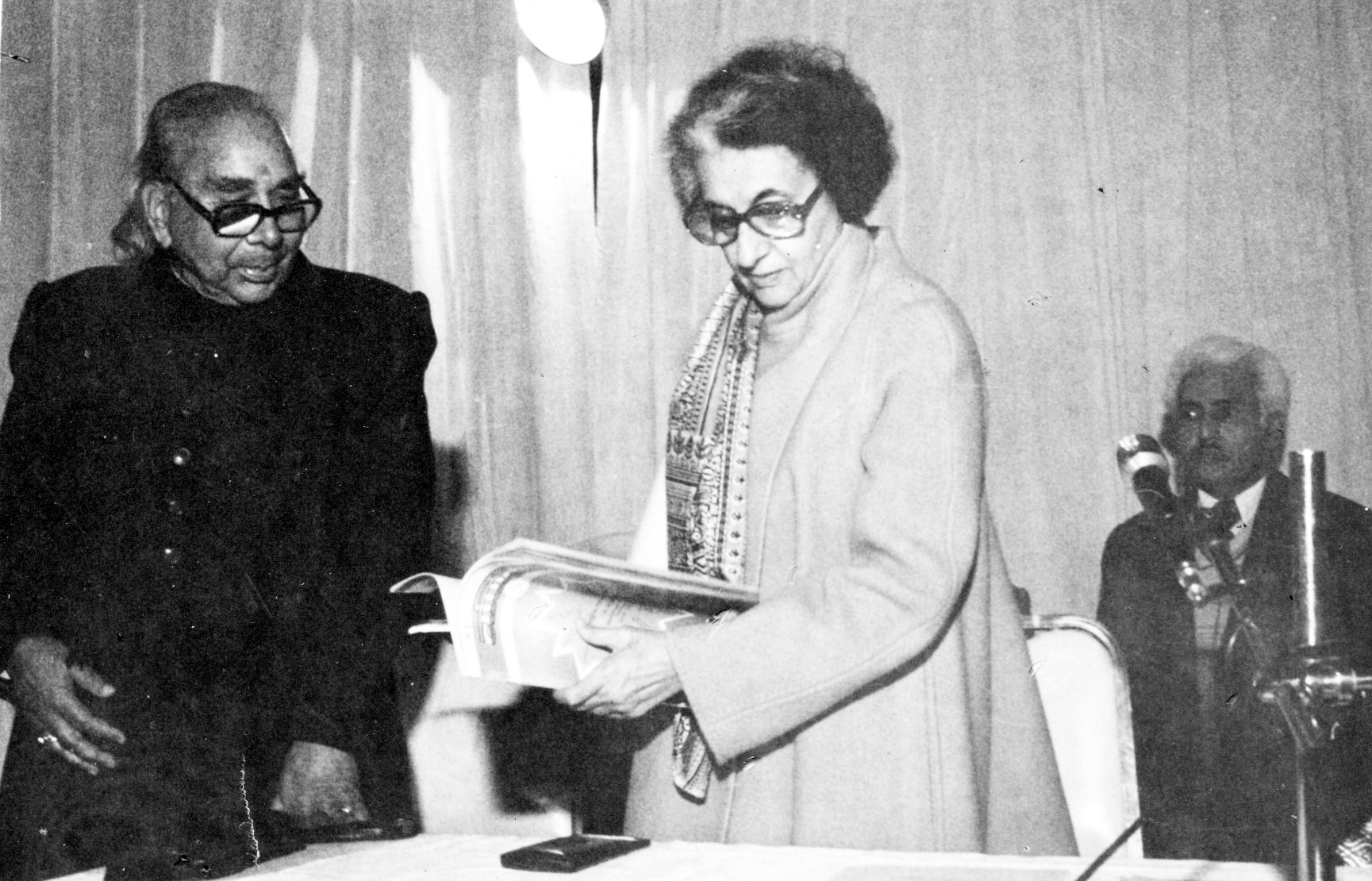 With Indira Gandhi During my 7-year association with the party, I produced not only the monthly journal, but also periodic brochures and pamphlets on burning issues of the day to educate the people on Congress policies and programs. In 1985, I edited and produced the 444-page history of the Congress to commemorate the party's birth centenary. The book to this day is acclaimed as one the most authentic records of the party's role in India's struggle for freedom, and in the reconstruction of post-independent India, particularly under the leadership of Jawarharlal Nehru and Indira Gandhi. Koshur Samachar In March 1991, I took over as Editor-in-Chief of Koshur Samachar, the tri--lingual organ of Kashmiri Samiti, the representative organization of Kashmiri Pandit community in the Indian metropolis. The onerous job presented a challenge at a time when hundreds and thousands of members of the Pandit Community were forced to leave their homes and hearths at the point of gun by Pakistani-trained terrorists.  H.H. Prof. Rimpoche presenting Sharda Samman to Gopinath Raina, Editor-in-Chief of Koshur Samachar. Former Governor of Jammu Kashmri Shri Jagmohan and Dr. Agnishekhar join theovation I brought my vast and varied editorial experience to bear upon the journal which became the authentic mouthpiece of the frustrations as also the aspirations of Kashmiri Pandits anywhere in the world. The quality of its layout, design and printing registered remarkable improvement. Its rich contents touched the socio-economic, cultural and political condition of the hapless Kashmiri Pandits and made the journal an interesting, stimulating and thought-provoking reading material. All members of our community all over the globe eagerly awaited the arrival of the prestigious publication. I discontinued to edit the monthly after November 1995, in the wake of the untimely death of my wife due to cancer in Miami, USA. I have since been shuttling between Miami, where my eldest son lives with his family, and New Delhi, where my two other sons and two daughters live with their families. In Miami, I edited Sanatana Sandesh, an official publication of the South Florida Hindu Temple (SFHT) from 1997 to 2004. |
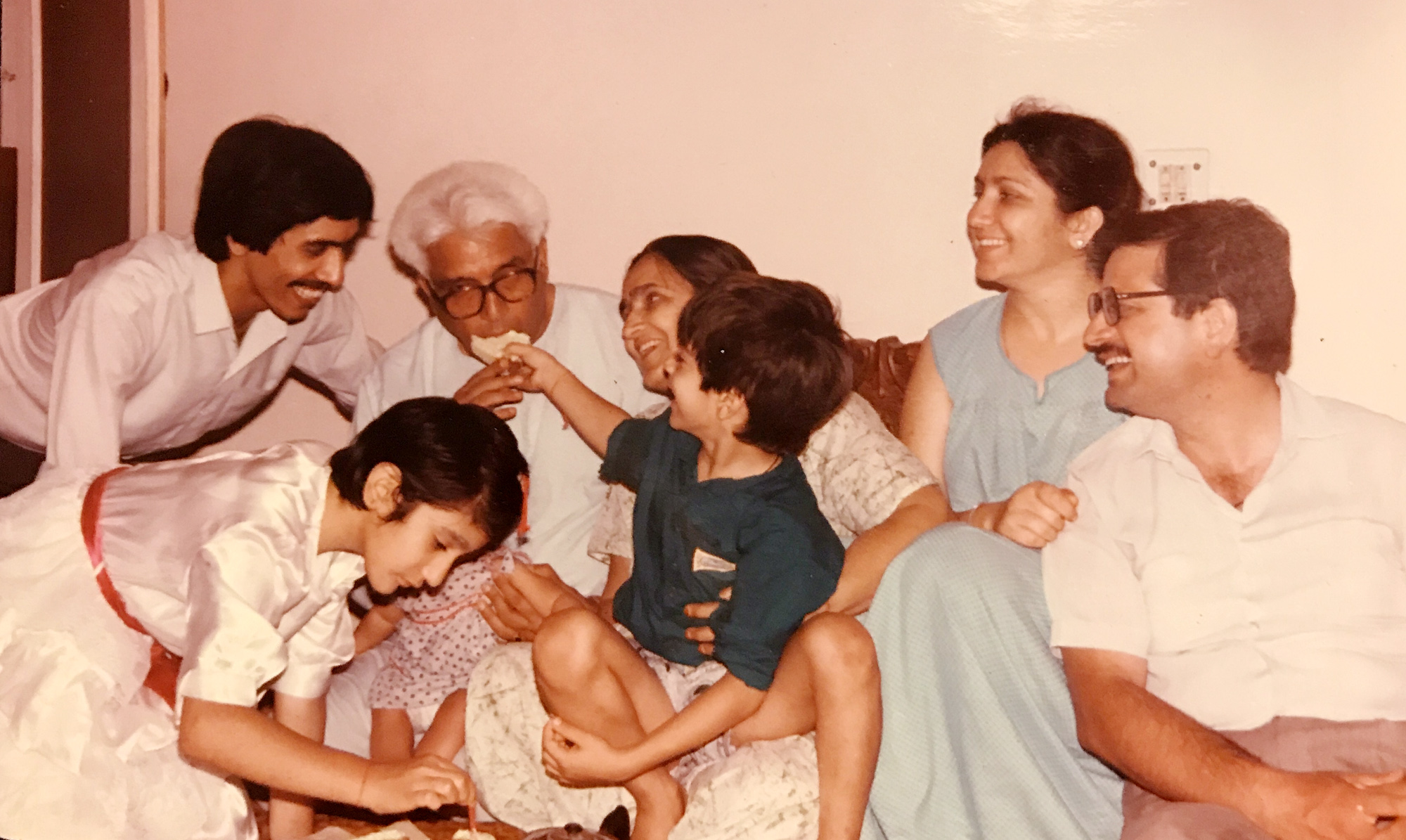
Papaji with his wife Chuni and daughters family
|
|
Awards
1. In 1967, I won a handsome cash award from government of India for, what was cited in the official gazette notification, "my outstanding performance in All India Radio (AIR) during the fourth general elections held in India". |
|
Abortive Careers
(a) After having been registered by the University of Punjab as a Research Scholar in early 1960, I was invited as a delegate to the annual Indian philosophical Congress held later that year in Chandigarh, the capital city of Punjab, in northern India. On the second day of the session, I presented a paper on the "Concept of good and evil in Sri Aurobindo's thought" which was very well received. |